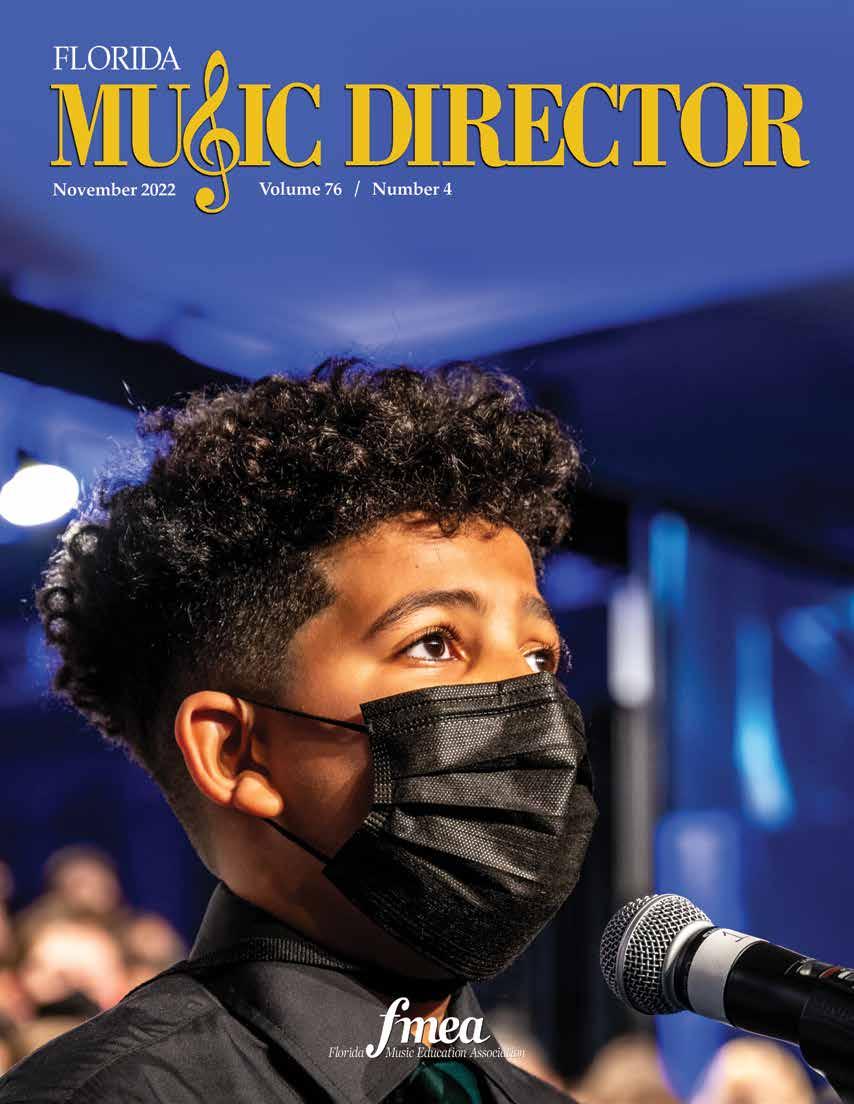

HELP, I feel like a fraud Music Teachers and the Impostor Phenomenon PLUS: FOA President-Elect Candidates FVA President-Elect Candidates FVA Middle School Chair-Elect Candidates Keep tending the fire! Recruiting and Maintaining Performing Ensembles Post-Pandemic Prelude to the 2023 FMEA Professional Development Conference
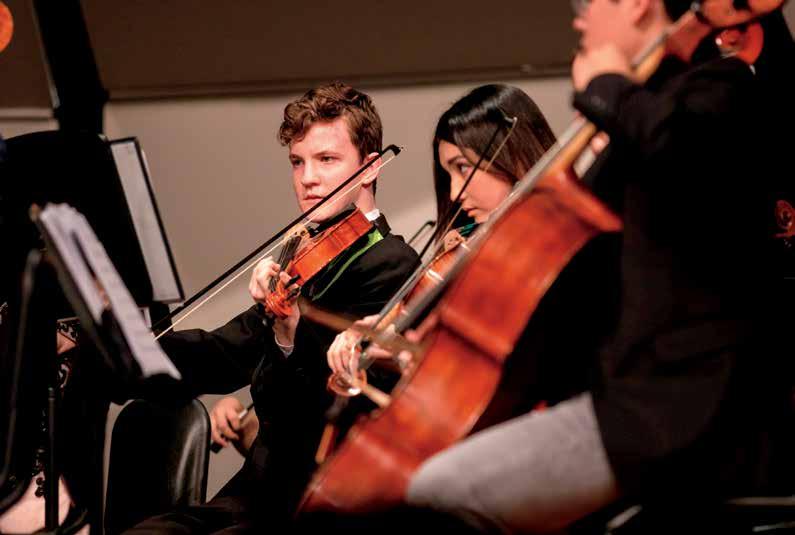
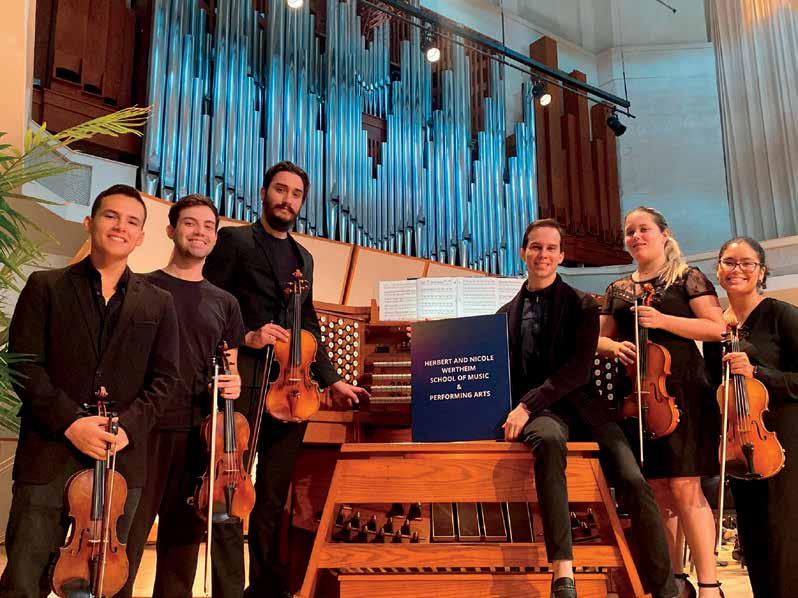
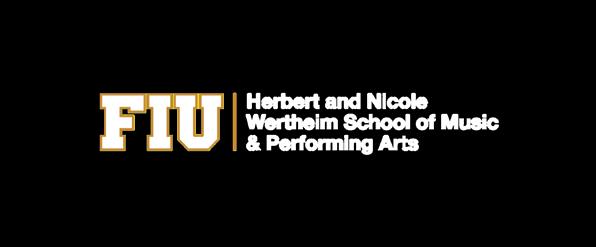
AUDITION DATES 2022-2023 November 19 | February 4 | March 18 Additional dates are available by appointment. Graduate assistantships are available. Undergraduate Degrees (B.M.) Instrumental Performance | Jazz Performance Music Business | Music Composition | Music Education Music Technology | Musical Theatre | Organ Performance Piano Performance | Vocal Performance Graduate Degrees (M.S.) Music Education - Traditional & Certification Tracks 4 + 1 Track (B.M + M.M.) Vocal Performance | Composition | Musical Theatre LIV Graduate Degrees (M.M.) Conducting | Instrumental Performance Jazz Performance | Music Composition Music Management & Production Music Technology | Musical Theatre Organ Performance | Piano Performance Vocal Performance Wertheim School of Music & Performing Arts at Florida International University 10910 SW 17th St., Miami, FL 33199 | (305) 348 2896 | music@fiu.edu | music.fiu.edu Conservatory-Style Training at a Research I University 2 Florida Music Director
Executive Director

Music
Kathleen D. Sanz, PhD Hinckley Center for Fine Arts Education
402 Office Plaza
Tallahassee, FL 32301 (850) 878-6844 or (800) 301-3632 (kdsanz@fmea.org)
Editor-in-Chief
D. Gregory Springer, PhD
Florida State University College of Music 122 N. Copeland Street Tallahassee, FL 32306 (850) 644-2925 (office) (dgspringer@fsu.edu)
Editorial
Terice Allen (850) 245-8700, Tallahassee (tallen1962@hotmail.com)
Judy Arthur, PhD
Florida State University, KMU 222 (850) 644-3005 (jrarthur@fsu.edu)
William Bauer, PhD University of Florida, Gainesville (352) 273-3182; (wbauer@ufl.edu)
Alice-Ann Darrow, PhD College of Music, FSU, Tallahassee (850) 645-1438; (aadarrow@fsu.edu)
Jeanne Reynolds (jeannewrey@gmail.com)



John K. Southall, PhD
Indian River State College, Fort Pierce (772) 462-7810; (johnsouthall@fmea.org)
(850) 878-6844
Florida
Education Association
Committee
Advertising Sales Valeria Anderson (val@fmea.org) 402 Office Plaza Tallahassee, FL 32301
Official FMEA and FMD Photographers Bob O’Lary Debby Stubing Art Director & Production Manager Lori Danello Roberts LDR Design Inc. (lori@flmusiced.org) Circulation & Copy Manager Valeria Anderson, (800) 301-3632 Copy Editor Susan Trainor FEATURES C ontents November 2022 Volume 76 • Number 4 DEPARTMENTS President’s Message .......... 4 FCAP Committee. ........... 7 Advocacy Report 8 Academic Partners .......... 39 Research Puzzles 47 Component News ........... 48 2022-2023 FMEA Donors ... 52-54 Committee Reports ......... 55 Executive Director’s Notes 60 Advertiser Index ............ 61 Corporate Partners 62 Officers and Directors ........ 63 PRELUDE TO THE CONFERENCE ....... 25-38 FVA President-Elect Candidates ......... 10-11 FVA Middle School Chair-Elect Candidates .. 12-13 FOA President-Elect Candidates ......... 14-15 FSMA Board of Directors ............... 18 FSMA Position Statement ............... 19 Help, I feel like a fraud Music Teachers and the Impostor Phenomenon ..... 20 Keep tending the fire! Recruiting and Maintaining Performing Ensembles Post-Pandemic ........... 40 November 2022 3
Be the Guiding Light in Your Community
Greetings, colleagues! First I would like to convey my sincere hope of recovery for all of our communities that have been impacted by Hurricane Ian. Our hearts go out to each of you, your students, and your programs, offering positive momentum during adversity. I’m sure emotions are high with sadness, anxiety, anger, and I hope some opti mism. I encourage you to stay positive. One of the greatest traits of being a music teacher is the ability to work through dif ficult situations. Florida Music Education Association (FMEA) is here to serve our component groups. We have a page on our FMEA website (FMEA.org/help) where you can offer help or request help related to your program’s specific needs at this time. I’m reminded of a quote that urges us to “Let your light so shine, that oth ers will see your good work.” Amongst everything going on in our world today, this is certainly an opportunity for music teachers across our state to be the guiding
light in their communities. As an exten sion of this, if you are a good example, if you “let your light shine,” other people who see your good example will poten tially model your behaviors for success.
Spreading the light can mean being the candle or being the mirror that reflects it. When we are the candle, we emit light into shadows and darkness. Others see the light, find their way, and then reflect that light, emulating us. Like mir rors, your students mimic your positive actions.
As you are developing academic achievement strategies in your class rooms, continue to think outside the box and use creative learning techniques. What kinds of new models would your music students find interesting? Are you connecting with students, parents, and your communities? Are you providing the resources and materials needed for stu dents’ success? How often are you com mitting to being self-reflective? Who is a
part of your “think tank” on and off cam pus? We certainly can all learn from oth ers who are music teachers in our district, state, and national communities. Some of my best learning outcomes are those that take place in non-teaching settings, i.e., private score study with other direc tors, master classes, composers’ lectures to music students, observing colleagues in rehearsals, etc. This might place you out of your normal comfort zone, but I submit to you, it can be of significant value as you build your community. Your students’ music-making will become even more rewarding as the following skills improve:
« Cognitive Domain (knowledge, com prehension, application, analysis, evaluation)
« Cognitive Functions (introverted/ extraverted sensing, feeling, thinking, and intuition)

« Music Achievement (success after making consistent effort)

The challenge to teach music from a multicultural perspective is important and can seem overwhelming. We play a principal role in the cultural formation of society, and music teachers can have a direct impact on the musical and multicultural sensitivity.
— Patricia Shehan Campbell
4 Florida Music Director President’sMessage
« Music Creativity (divergent and con vergent thought processes)
« Music Transfer (applying learning outcomes from one situation to a set ting that is similar)
The quote above by Allan Bloom is profound. Studies have supported the importance of an education. Furthermore, we’ve seen the data focused on music students’ success and its relationship to inclusiveness, productivity, scholastic achievement, and life beyond high school in communities. But most important is the ability of our music teachers to moti vate and be that guiding light in situa tions where students might give up. We’re so grateful to our FMEA teachers who believe in our mission statement: “pro moting a quality, comprehensive music education in ALL Florida schools.”
I challenge each of our music teachers, students, administrators, parents, stake holders, and communities to be the guid ing light for our students of today, tomor row, and the future. Finding solutions is a prerequisite to educating students in our classrooms.

In 2022 and beyond, we should consid er being less product-oriented and give



more credence to the idea of the pro cess, which emphasizes an opportunity to make transfers to other scenarios in music, and certainly in life.
I look forward to seeing you in-person and on webinars. Remember, our 2023 FMEA Professional Development Conference promises to be amazing, so please register NOW at FMEA.org.

Education is the movement from darkness to light.
— Allan Bloom
I’ve learned that people will forget what you said, people will forget what you did, but people will never forget how you made them feel.
— Maya Angelou
Shelby R. Chipman, PhD, President Florida Music Education Association
November 2022 5
Shelby R. Chipman, PhD
President Florida Music Education Association
CO N T ENTS 25 Pre-Conference 26 Welcome 27 Important Dates 28-29 Registration 30-31 Contracted Hotels 32 Personal Health and Safety 33 Concert Tickets / FAQ 34 All-State Rehearsal Locations 36 3K Run & Walk 37 Student Experiences 38 Pilot Program FMEA Professional Development Conference


Naples Concer t Band SEEKS NEW MUSIC DIRECTOR / CONDUCTOR FOR THE 2023-2024 SEASON Idyllic Southwest Florida destination awaits the right candidate! Forover50years,theNaplesConcertBandhasbeen charmingitsloyalaudienceinthebeautifulsettingof CambierParkintheheartoftheCityofNaples. Boastingamemberstrengthofnearly100musicians andanaverageaudiencesizeof1,500 2,500 throughouttheplayingseason(October–April),we havebeenrecognizedbytheCityofNaplesasa “culturalinstitution”thatcontributestothequalityof lifeandgrowingreputationofthecityknownas “Paradise”ontheCoastofSouthwestFlorida.Thereis nothingmoresatisfyingthanaconcertintheparkona sunnySundayafternooninthedeadofwinter! TheMusicDirector/Conductorplaysaleadingrolein thesuccessoftheorganization,andissupportedbyan activeBoardofDirectors,anenthusiasticandtalented membership,andahealthyoperatingbudgetmade possiblebyourdevotedaudienceandgenerous sponsors.Wearelookingforacandidatetoleadusinto thenext50yearsofmusicalmagic. Interestedcandidatesareaskedtoprovidetheir qualificationsby D December 31, 2022.Whenresponding totheopportunity,weaskforthefollowing: 1.Acoverletterdescribingyourinterestand experience 2.Aresumeofyourprofessionalexperienceand educationalbackground 3.Samplesof3recentconcertsyouhave programmed 4.Linkstorecordingsofyourwork(i.e.,YouTube) 5.Threereferencesincludingcontactinformation FinalistswillbeselectedinJanuary2023,andall candidateswillhaveanopportunitytoworkwiththe ensembleduringthe1st Quarterof2023.Adecisionis expectedbyApril2023. PARADISE IS CALLING! FOR MORE INFORMATION Contact: Bud Gartland, Vice President NCB Email: bud@evg3consulting.net Additional details can be found on our website: www.naplesconcertband.com/conductor-search 6 Florida Music Director
Committee Reports
It’s a Marathon … and a Sprint.
Fred Schiff, Chairperson

HURRICANE HELP
Long after the cameras are gone and the images of destruction from Hurricane Ian have faded, our music teaching friends will be left with the daunting task of figuring out how to rebuild what they need.
For those affected, we want you to know we are working on short- and longterm solutions.
The Sprint
Because needs are just beginning to be defined, the best way to help is to have funds available for immediate projects. The good news is FMEA has the Mel and Sally Schiff Music Education Relief Fund, which was specifically created to help those in crisis. With FMEA as the clearinghouse for donations, we are in
a unique position to centrally facilitate contributions you may take in from your fundraisers. You should also know that 100% of the money donated to FMEA is used for its intended purposes. Full dis closure: while my company and family have been significant contributors to this fund, I do not serve on the FMEA com mittee that determines recipients, nor will I ever.
For those of us who were unaffected by the storm, please consider a cash dona tion so we can respond—now and in the future. Just go to FMEA.org/help

The Marathon
Here is where our corporate and aca demic partners and exhibitors can really help. We know that every level of music
education caught in the path of Ian— from elementary schools to collegiate programs—were hurt in some way, but once again, we just don’t know how badly yet. My ask is simple—if I haven’t already spoken to you, contact me so we can develop a plan to match the needs of our teachers with the resources your company or institution has available. Rest assured, music educators will need your help.
If you have a secure roof over your head, a place to go to work, and a func tioning school for your children, then this is the time to consider the people who don’t. Because after the news cameras are gone and the images have faded, we will be the ones still here—ready, willing, and able to help.
November 2022 7
FLORIDA CORPORATE & ACADEMIC PARTNERS COMMITTEE
Advocacy Report
We the People – PART TWO
Last month, I reflected on a perfor mance of the Broadway revival of Into the Woods that I was lucky enough to attend in August. I marveled at how a widely diverse group of strangers could have a profound shared artistic experi ence (“We the People – Part One,” Florida Music Director, October 2022, page 6). Our democracy is an inspiring ideal just like the positive, hopeful vision of Act One of
Into the Woods. In this follow-up article, I will discuss what happens after the inter mission. Those familiar with the show know that Act Two is much more compli cated and dark. In the words of Stephen Sondheim,

Into the woods
But not too long:
The skies are strange,The winds are strong.Into the woods to see what’s wrong ...
Just like Act Two of Into the Woods, democracy is complicated, difficult, and darker at times. Last month, I promised to unpack some of the issues around voter turnout. Many hypothesize that people don’t vote because they are disinterested or cynical. That’s not necessarily true.
Voting is hard. Voting requires effort. Getting to the polls can be expensive and time con suming, and it requires reliable trans portation. Voting is especially hard for
Jeanne W. Reynolds Chairperson Government Relations Committee

young people who have not grown up around a culture of voting. Recently I volunteered to register high school students to vote. It was enlightening. After completing a paper registration form, one young woman shared that she would be voting online. Obviously, she had no idea how to vote. And worse yet, I had not clear ly explained how to vote. Going to a polling place and voting by mail are foreign concepts to some young people. I was surprised to find some students did not know how to address and stamp an envelope until I realized that students born in 2004 would have had very few experiences mailing a letter.
Into the woods to find there’s hope
Of getting through the journey.
How do we find hope to get through this challenging voting journey? As teachers, we know that learning a new skill can be difficult, challenging, and frustrating. Think about the scaffolding we do to teach beginning instrumental ists. We take nothing for granted. We give the students the step-by-step tools they need to be successful.
Voting is no exception to that. Use your significant intellectual property and skills to help friends, family, and in some cases, students to make a voting plan to include:
« Registering or checking registration status
« Finding the voter’s polling place
« Reviewing sample ballots
« Knowing what identification docu ments are acceptable to vote in person
« Securing transportation to the polling place
Read Part One of “We the People” on page 6 of the October edition of FMD. (bit.ly/fmd-oct)
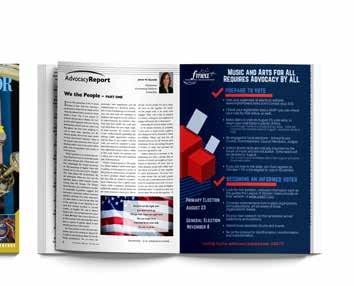
« Providing information about mail bal lots including how and when to return a mail ballot so it is counted on time and how to check the status of a mail ballot
You can find this information on the site of your local supervisor of elections: https://www.myfloridaelections.com/ Contact-your-SOE
Informed Voters
Being an informed voter takes effort. Just as there are no perfect performanc es, there are no perfect candidates. It is our job to vote for the best candi date. I am perplexed by people who vote for candidates who don’t appear to be aligned with their interests. I’m guessing these voters are persuaded by simple name recognition, political ads, or worse yet, misinformation or mal information. Being an engaged voter means doing your own research. Nonpartisan sites like https://www.vote411.org maintained by the League of Women Voters is a good place to start.
As arts educators, we know that out standing artistic performances don’t hap pen magically. They require tremendous attention to detail, time, and effort. This is true for voting as well. It takes time and effort to make informed voting choices. And if we are going to strengthen our
8 Florida Music Director
democracy—“we the people” must make this effort.
If you are reading this article after the November 8 election—no problem. Just as you reflect after a performance regard ing the improvements you want to make going forward, this is a great time to talk about election results, what percentage of voters turned out to vote, and what you will do differently in the future to inspire greater engagement and to strengthen our democracy. It is also the perfect time to reach out to newly elected school board members, local legislators, and state legis lators to congratulate them and to make them aware of your arts programs.
Inspiration
People are engaged and vote when they are inspired. As the saying goes, where there’s a will, there’s a way. It is our job as advocates to motivate friends and col leagues to understand “we the people” means each one of us. Let’s think back to those beginning instrumentalists. Like Act One of Into the Woods, at the begin ning of the year, we present an exciting, compelling vision of a future as a success ful musician, complete with shiny new instruments. When things get challeng ing in Act Two, we dig deep to provide constant support, scaffolded instruction, and inspiration to keep students engaged by building a collaborative, supportive, inclusive culture. Turns out these are the same unique skills needed to inspire fellow educators and citizens to engage enthusiastically in the shared experience of American democracy. Are you willing to take on that challenge and go on that journey?
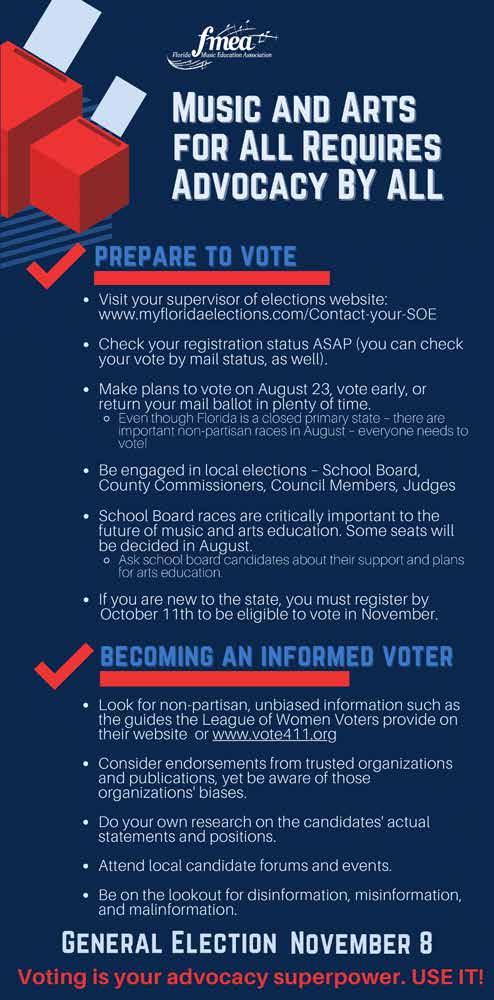
Into the woods, no telling when,
Be ready for the journey.
November 2022 9
FVA PRESIDENT-ELECT CANDIDATE
Jennifer Rock
AFlorida native, Jennifer Rock graduated with a bachelor’s degree in music edu cation from Southeastern University and a master’s degree from the College of Music at Florida State University. Ms. Rock is in her 22nd year of teaching, spending 12 years teaching at Stone Middle School in Melbourne, Florida, and the last 10 years at Heritage High School in Palm Bay, Florida. Jennifer is a board-ap proved Florida Vocal Association adjudicator and has served as chairperson of FVA District 10 representing Brevard and Osceola counties from 2009 to 2012 and from 2018 to 2020. She has also served on the Music Leadership Team and Music Advisory Board for Brevard Public Schools.
If given the honor of serving the Florida Vocal Association as president-elect and pres ident, Ms. Rock would like to continue to cel ebrate and promote the beautiful diversity of our association and the students we serve. It is her belief that we must continue the necessary work to remove barriers that our underserved populations face within our schools and com munities. She would also like to work with our association to provide greater support for schools and choral programs that struggle to retain highly qualified choral educators.
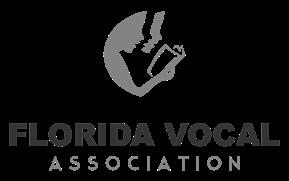
Ms. Rock was blessed to attend schools with strong music programs and highly qualified music educators in elementary, middle, and high school, and it is her desire that every stu dent in Florida has the same opportunity.
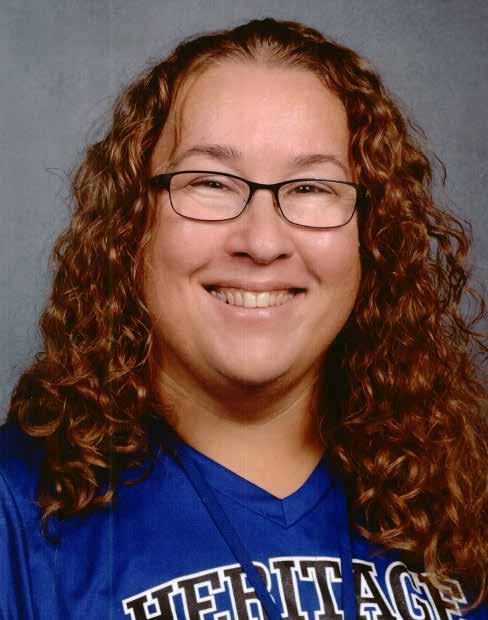
10 Florida Music Director
FVA PRESIDENT-ELECT CANDIDATE
David Verdoni
David Verdoni has the privilege of serving as choral director at his alma mater, Riverview High School in Sarasota. He holds the BA in music education from Florida Atlantic University, the MME from Florida State University, and the MEd in educational leadership from the University of West Florida. He is a native of Mexico City but considers himself a Floridian having moved to the state at the age of five. Mr. Verdoni has been teaching since 2009.

FVA has played a special part in Mr. Verdoni’s musical upbring ing. As a middle school and high school student, he was given sever al opportunities to access musical experiences that he believes had an essential impact in his inter est in pursuing music education. Experiences such as MPA as a vocal soloist, student conductor, small ensembles, choral MPA, and AllState were a huge part of what made Mr. Verdoni fall in love with music-making and teaching. He is honored to be considered for the opportunity to serve the very orga nization he grew up with.
Mr. Verdoni enjoys working on behalf of others to encourage and support personal and professional growth in fine arts education. While in college he served on the FMEA board as president of the Florida Collegiate MENC (now Florida NAfME Collegiate) between 2007 and 2009. Since beginning his teaching career, he has served as coordinator and chairperson for FVA District 11, participated in FMEA’s Emerging Leaders Program, is a board-approved adjudicator, and has served as the all-state chairperson for FVA since 2017. Mr. Verdoni is the chair of Riverview High School’s School Advisory Council and lead
mentor teacher as part of the county’s Induction Program for new hires giving him a broad perspective in leadership and service opportunities in his teaching community. As an arts education advocate, he is a member of the steering committee of the Community/Schools Partnership for the Arts in Sarasota and collaborating teacher in districtwide arts initiatives. Along with his wife, he is the co-cre ator of the Inspire and Empower SA Festival that invites SA singers, grades 8-12 for a day of leadership and musical learning.
If provided the opportuni ty to serve as president-elect and president of the Florida Vocal Association, he would like to increase support and services to FVA members that correlate to their needs and experience in the class room. He would like to explore developing and improving systems to solicit feedback and suggestions for improvements to FVA initia tives throughout the academic year. Develop ways to create greater con tinuity in the organization as board members change to ensure that FVA is meeting short-term and long-term goals. Find ways to capitalize on relationships with the other FMEA components and other organizations that will support our current members’ needs and engage new members including collegiate students.
Mr. Verdoni is humbled to have the opportunity to be considered as the president-elect candidate and would be honored to serve. He is thankful to his wife, Whitney, and his three boys, David, Jacob, and Lucas, as well as his friends, colleagues, and mentors for their encouragement to pursue leadership opportunities throughout his life.

November 2022 11
FVA

SCHOOL
CANDIDATE
Miguel Oquendo
Miguel Oquendo is a graduate of the University of South Florida, earning the BS in music stud ies. Mr. Oquendo was a member of the award-win ning USF Chamber Singers under the direction of John Richmond and Richard Zielinski. One of his most mem orable choral experiences was going on tour with the USF Chamber Singers, participating in a choral compe tition in Miedzyzdroje, Poland, and being named Grand Champions. While at USF Mr. Oquendo was also a member of the Opera Theatre Program under the direc tion of Teresa Andrasy. He serves as a cantor for Nativity Catholic Church and as the musical theatre director of the Showcase Players and the Jr. Showcase Players in Brandon, Florida.
Mr. Oquendo has served as choral director at Barrington Middle School for the past nine years. In his time at Barrington, he has worked very hard to build his choral program. His choirs have consistently earned superior ratings at music performance assessments. Barrington students have participated in all-county, all-state, Florida ACDA, Southern ACDA, and National ACDA honor choirs as well as solo and ensemble MPA. Mr. Oquendo also serves as the Master Musician choral advisor in Hillsborough County Public Schools. He is an active mem ber of ACDA and FMEA/FVA. In 2022 Mr. Oquendo was named his school’s Ida S. Baker award recipient.
Mr. Oquendo is an active FVA board-approved adju dicator and has served as an ACDA and all-state judge. He has enjoyed giving of his time helping past all-state coordinators and learning the process. He believes that All-State is an integral part of choral students’ lives. The experience they gain and what they in turn share with their fellow classmates is priceless. It would be an honor to serve the association as middle school chair-elect and pro vide future all-staters with a life-changing experience as he experienced as an all-stater in Oklahoma All-State 1994.
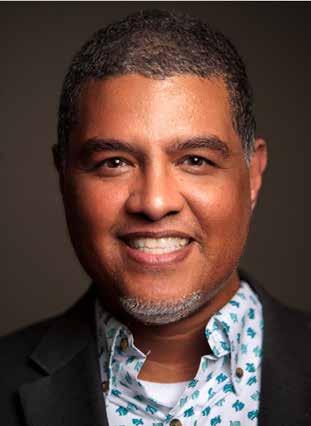
MIDDLE
CHAIR-ELECT
12 Florida Music Director
FVA
Gina LaVere
Gina LaVere earned the BME at Florida State University. She is the choral director at Dr. David L. Anderson Middle School where she serves as elective department chair.

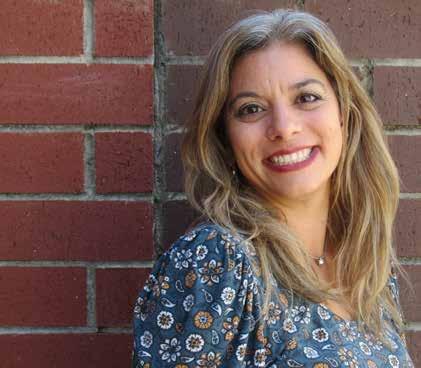
During her 22-year teaching career, she has been Teacher of the Year in 2010 and 2019. Mrs. LaVere’s choirs have consistently received the highest ratings at all FVA events. She has served as adjudi cator and clinician for the DoDDea European regional talent show for two years. Additionally, during her career she has been a clinician for the Santa Rosa Middle School AllCounty Honor Choir, choir director at St. Sylvester Catholic Church for five years, director of the TCCS (Treasure Coast Community Singers) for middle school youth group, conducted pieces for the Martin County Music in Our Schools performance for four years, and built two choir programs, in Santa Rosa County and in Martin County where she continues to teach. Her leader ship roles have included coordinator of secondary choral music for Santa Rosa and Martin counties, and she is in her second year as chairperson of FVA District 13. Mrs. LaVere is a member of NAfME, FMEA, and FVA. She strongly believes in the all-state process, having had students participate in an all-state choir 21 of her 22 teaching years.
If elected Gina LaVere would continue to make the all-state process more accessible for all directors and their students. She believes that by providing the support needed from preparation for the test to more reminders to directors during the audition pro cess, everyone will benefit beyond the test by creating a high standard of excellence in the choral programs in our state. She also intends to work with new Florida directors to guide them through the all-state process.
MIDDLE SCHOOL CHAIR-ELECT CANDIDATE November 2022 13
Raine Allen
Raine Allen is the director of orchestras at Dr. Phillips
High School, the conductor of the Overture Strings ensemble with the Florida Symphony Youth Orchestra in Orlando, Florida, and the former district chairper son for FOA District 8. In 2011, she earned a bachelor’s degree in instrumental music education (magna cum laude), and in 2015, she earned the MME (magna cum laude), both from the Florida State University.
After returning to the classroom, Mrs. Allen con tinued contributing to the field of music education by working with Orange County Public Schools to develop and publish curriculum resource materials for middle and high school directors. She has also been pub lished by the American String Teachers Association’s The String Section, with her article entitled “Student Leadership: It’s For Your Program, Too!”
In the summer of 2018, she was nominated to the Florida Music Education Association’s Summer Institute. In 2022, Mrs. Allen was asked to contribute to the FMEA think tank “Visioning Resilience for Music Education in the State of Florida” and to attend the FSMA Leadership Summit. Mrs. Allen is also a frequent presenter at professional development conferences, giv ing presentations on topics like teacher burnout and pedagogical diagnostic techniques.

Mrs. Allen has over a decade of experience in the classroom and is a highly sought-after conductor, cli nician, and intern supervisor. The orchestras under her direction consistently receive superior ratings at both district and state events, and are active in the communi ty through arts outreach performances.
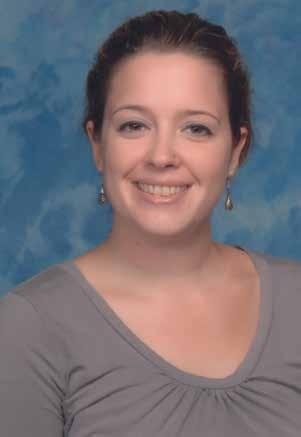
FOA PRESIDENT-ELECT CANDIDATE
14 Florida Music Director
Andrea Szarowicz
Andrea Szarowicz is in her 20th year as a music educator. She received her undergraduate degree from the University of South Florida with a bachelor’s degree in music and gerontology. She also holds an MBA from the University of Arizona and the MME from Florida State University. Currently she is the director of orchestras at Steinbrenner High School in Lutz, Florida. Over the span of her career, she has taught all levels, elementary through high school, and has taught orchestra, guitar, keyboard, band, exceptional music education, and eurythmics. Because of her expe rience and successful teaching practices, Mrs. Szarowicz is regu larly requested to supervise music interns for the state of Florida.

Mrs. Szarowicz’s orchestras have had the opportunity to per form in a wide variety of venues. They consistently attend both dis trict and state MPAs and have performed at the FMEA Professional Development Conference and the ASTA National Conference. In addition, they have performed with Lindsey Stirling and Barrage 8, and have participated in multiple side-by-side concerts with the University of Miami, Florida Gulf Coast University, University of Central Florida, Jacksonville University, and Florida State University.
Mrs. Szarowicz has served on the FOA Executive Board since 2010. She has served as a district chairperson and currently has the honor of serving as the 11-12 all-state symphonic orchestra coordinator, a position she has held since 2012. In addition, she has served on the FMEA conference and mentoring committees, pub lished articles for American String Teacher Association and GIA publications, and presented at ASTA and FMEA conferences. Mrs. Szarowicz is an active adjudicator for FOA and FBA, and she enjoys time with her family.
If Mrs. Szarowicz is honored to serve as president-elect, she hopes to increase membership, actively celebrate the diversity in our organization, and further support our teachers and students.

FOA PRESIDENT-ELECT CANDIDATE
November 2022 15

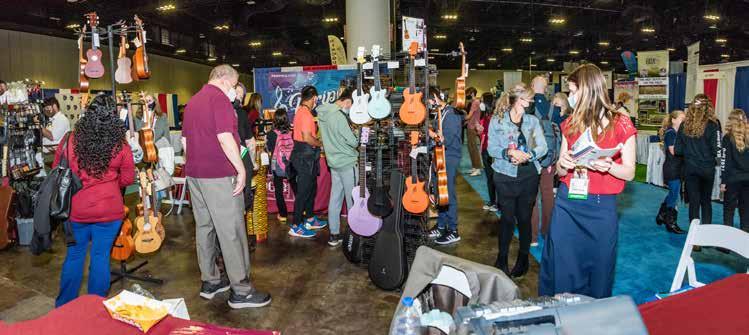
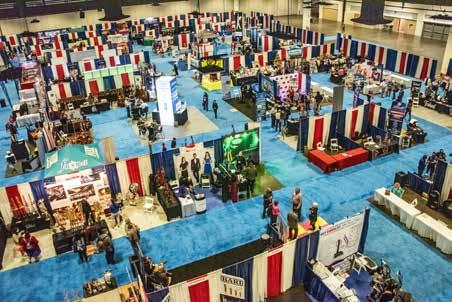
EXHIBITOR REGISTRATION DEADLINE November 15, 2022 REGISTER TODAY fmeamediakit.org/#/trade-show The Florida Music Education Association’s Annual Professional Development Conference Tampa Convention Center January 11 -14, 2023 Attended by more than 10,000 people including elementary and secondary music teachers, music supervisors, college students, college music teachers, school administrators, K-12 students performing in the all-state ensembles, students and professional musicians performing with invited performing ensembles, and parents of performing students. BE AN EXHIBITOR 2023 FMEA Professional Development Conference Florida Music Education Association II : 402 Office Plz Tallahassee FL 32301 : ll 1-800-301-FMEA(3632)
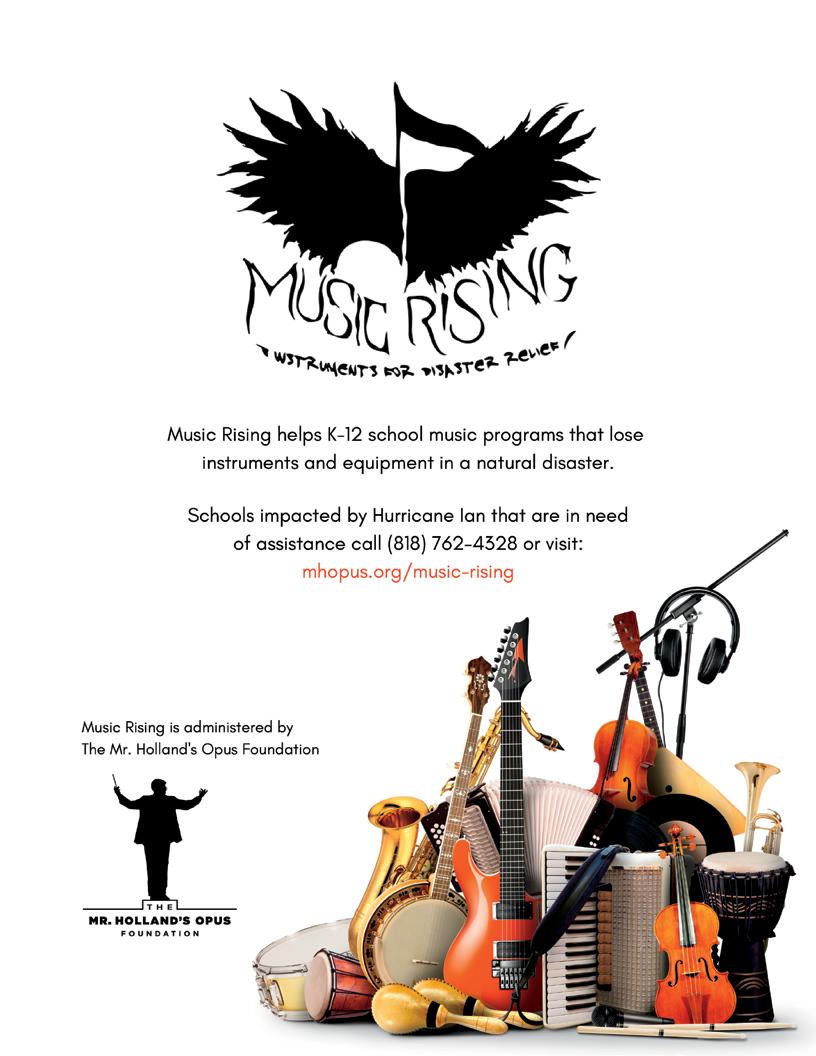
November 2022 17
Florida School Music Association Board of Directors
PRESIDENT Jane Goodwin Sarasota County School Board
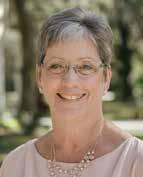

PAST
Valerie Terry Retired
NON-PUBLIC
Florida School Boards Association
Jane Goodwin
Sarasota County School Board
Bill Slayton Escambia County School Board
Florida Association of District School Superintendents
NORTH REGION
Russell Hughes Walton County School District
SOUTH REGION Bob Shayman Hardee County Schools
Florida Association of School Administrators
Benny L. Bolden, Jr., PhD Principal, R. Frank Nims Middle School
Member-at-Large
Jeanne Reynolds Pinellas County Schools (retired)
Florida Parent Educators Association & Home Education Foundation, Inc.
Rebekah Ricks Florida Music Education Associations Representatives
FLORIDA MUSIC EDUCATION ASSOCIATION
Steven Gabin Tradition Preparatory High School
Vivian Gonzalez Miami Arts Studio 6-12 @ Zelda Glazer
FLORIDA BANDMASTERS ASSOCIATION Jeff Cayer Marshall Middle School
ADVISOR
Michael Dye Executive Director, Florida Vocal Association
FLORIDA MUSIC SUPERVISION ASSOCIATION

Lindsey Williams, PhD Seminole County Public Schools
FLORIDA ORCHESTRA ASSOCIATION
Cheri Sleeper Strawberry Crest High School
FLORIDA VOCAL ASSOCIATION
David Pletincks
Powell Middle School
Advisory Members
Neil Jenkins
Donald
Michael Dye
Kathleen D. Sanz,
N O T E S FLORIDA SCHOOL MUSIC ASSOCIATION
FBA Executive Director
Langland FOA Executive Director
FVA Executive Director
PhD FSMA & FMEA Executive Director
PRESIDENT
2021-2023
SCHOOLS REPRESENTATIVE Vacant 18 Florida Music Director
The Florida Music Supervision Association (FMSA) brought forth a request to the Florida School Music Association (FSMA) to develop a position statement about the use of music in school music programs and for performance at Music Performance Assessments. Please see the position statement below.
FSMA Position Statement on Music Literature Selection

The Florida School Music Association (FSMA) is responsible for the oversight of all interscholastic music events in Florida. FSMA has empowered the following Florida Music Education Association (FMEA) component organiza tions to facilitate and supervise music performance assessments annually for ensembles and solos/small ensem bles: Florida Bandmasters Association (FBA), Florida Orchestra Association (FOA), and Florida Vocal Association (FVA).
Each component curates a required Music List(s) for at least a portion of Music Performance Assessment program ing. Inclusion of a specific composition is reviewed by a committee of professional music educators who follow a procedure to evaluate each composition for artistic value and quality and then each music selection is further categorized based on instrumentation/voicing and difficulty. Music literature selected is added to the requisite association’s required Music List. These lists span nearly the entire length of music history through today. Each list is then revised annually with new music selections added as well as extant selections removed from the list. Music selections included on the required Music Lists for each component are not included as a part of, nor to promote any ideology, faith tradition, or social movement either past or present.
Discussions of the demographic background of each and every composer/arranger is encouraged. These discus sions can help to inform and possibly inspire students to discover that there are and have been composers with whom they can identify.
Adopted by the FSMA Board of Directors on October 17, 2022.
FLORIDA SCHOOL MUSIC ASSOCIATION N O T E S
November 2022 19
Help, I feel
Music Teachers and the Impostor Phenomenon
by Rachel Sorenson, PhD
Have you ever felt like ...
Everyone around you knows more than you do?
Your achievements and successes have somehow been the product of luck?
You exhibit perfectionistic tendencies and have to be “the best” at things?
You procrastinate when starting new projects due to a fear you may fail?
Evaluations and assessments of your work are a great source of stress and anxiety?
20
like a fraud!
The feelings listed on the previous page are just a few examples of the effects of what researchers and psychologists refer to as the Impostor Phenomenon (often colloquially referred to as “Impostor Syndrome”). The term Impostor Phenomenon (IP) was coined in 1978 by professors Pauline Clance and Suzanne Imes, who discovered that their intelligent and high-achieving female students were experiencing many of the symptoms described (Clance & Imes, 1978).
Over the past four decades, research on IP has expanded immensely. Although Clance and Imes originally studied IP among female graduate students specifically, subsequent researchers have gone on to study IP among various populations, including men, undergraduate students, working professionals, and underrepresented and marginalized individuals (Bravata et al., 2020). Reports
vary, but some researchers estimate that more than 70% of individuals may experience IP at various times. Although IP is not a diagnosable medical condition, experts agree that its effects are real and can negatively impact the mental and emotional well-being of those experiencing it. So, what exactly do experts know about this seemingly prevalent phenomenon?
« Feelings of fraudulence – One of the defining characteristics of IP is a feeling of fraudulence. Many individuals with IP feel as if they don’t belong in their cur rent position and will eventually be “found out.” This fundamental issue manifests in different ways, such as fear of evaluation, perfectionistic tendencies, and the overestimation of the abilities of others.
« Fear of evaluation and assess ment – For someone who has a fear of being exposed as a fraud, evaluation by their superior or peers is particularly challenging. What better way to be exposed as a fraud than to have your per formance, competence, or intelli gence assessed?
« Perfectionistic tendencies –Perfectionism is a common defense mechanism for those who fear evaluation. Many with IP feel the need to achieve perfec tion (thereby often overextending themselves) to stave off criticism and negative evaluations and to avoid being exposed as a fraud.
« Overestimation of the abilities of others – Many people with IP have a skewed perception of the competence and intelligence of others, assuming that everyone else knows more than they do. Feelings such as these can result in unhealthy comparisons with others.


« Gender – Although some research ers have found that women expe rience IP more frequently and intensely than men, men have also been shown to experience IP. IP can be difficult to measure accu rately, especially because most measurement scales require indi viduals to self-report. Research on IP is scarce on trans and gender expansive individuals, but some suggest that these populations may be particularly susceptible to IP feelings (Joshi & Mangette, 2018).

« Anxiety – Due to factors such as fear of failure and unhealthy comparisons to others, many with IP suffer from generalized anxiety (Clance & O’Toole, 1987).



November 2022 21 Continued on page 22
Impostor Phenomenon
Valerie Young (2011), scholar and IP expert, defined five IP personality types to help individuals identify and label their impostor tendencies. Many people find it helpful to discover that they fall into one or more of these categories:

« “The Perfectionist” sets unrealisti cally high goals for themselves and feels like a failure when they don’t live up to these goals. They are often accused of being overachievers or micromanagers.
« “The Superwoman/man” is primar ily concerned with how hard they work. They often take on more work than others, stay at work long after everyone else has gone, and are often labeled as “workaholics.”
« “The Natural Genius” judges their competence based on the speed with which they can learn a skill or accom plish a task. They are primarily con cerned with getting things done cor rectly on the first try and can have a track record of being straight A students.
« “The Soloist” feels the need to accomplish tasks on their own, at all costs. They struggle to delegate and/ or accept help from others for fear it might make them seem less compe tent.
« “The Expert” feels the need to know everything about a given subject. They never feel as if they know enough and even avoid new experiences or job opportunities for fear there must be others who know more or are better suited for the role.
How is IP measured?
Over the years, experts have developed scales designed to measure the extent to which someone may be experiencing IP. The most commonly used scale was designed by Pauline Clance, who helped coin the term Impostor Phenomenon. This scale is called the Clance Impostor Phenomenon Scale (CIPS) and is com posed of 20 statements to which a person rates their level of agreement between 1 (not at all true) and 5 (very true). Some examples of these statements include, “I can give the impression that I am more competent than I really am” and “I often compare my ability to those around me and think they may be more intelligent than I am.” Individuals taking the test are urged to answer the questions with the first response that comes to mind rather than dwell on the answer. A per son’s IP level is determined by adding their responses to the 20 items. The full CIPS is available for personal use through Dr. Clance’s website at https://pauline roseclance.com/pdf/IPTestandscoring.pdf
IP and Music Teachers
Although there is little published research on IP and music teachers, it is reasonable to assume that music teachers are a group of people who are highly sus ceptible to IP feelings. As a group, music teachers are generally hardworking, intelligent, and high-achieving individ uals. The undergraduate requirements to become a music teacher are among the most stringent and demanding of any degree program, to say little of the skill
and competence required in the day-today life of a music educator.
All teachers are evaluated. However, music teachers are among the few whose hard work and competence are on dis play through public performances such as concerts and parades. Those who also participate in adjudicated music perfor mance assessments receive actual grades for their groups’ performances—grades that are public knowledge. (This is in addition to each teacher’s school- and district-specific evaluation policies for their classroom teaching.) For someone who may dread feedback and evalua tions due to IP, the idea of putting their teaching on display in the form of con certs, parades, and music performance assessments is a recipe for added anxiety.
Furthermore, many who experience IP compare themselves to others con stantly, often to an unhealthy extent. In a field where competence is assessed publicly and the work of our peers is on display all around us, comparisons are difficult to avoid. We must also remem ber that before music teachers were classroom educators, they were musi cians. For many, the comparative nature of a performance-based task such as music-making has been eliciting stress and anxiety for many years. In a study of IP among student music teachers, some admitted that IP feelings as a music teacher are intertwined with IP feelings as a musician (Sorenson, 2022). For many musicians, music-making is not a career choice, but a way of life and a primary component of one’s identity. To put one’s
22 Florida Music Director
Continued from page 21
efforts and creative product on display for others is unavoidably linked to eval uation of oneself.

You are describing me!
What can I do?
Many people with IP harbor feelings such as those described here without discuss ing them with others for years. Therefore, the first step in alleviating IP feelings for many is learning that those feelings have a name. There is validation in knowing that others have similar experiences. For this reason, discussing your IP-related feelings with others is an important first step toward conquering them.
In their initial studies on IP, Clance and Imes recommended group therapy as an effective tool for people dealing with IP. Women in their initial studies who participated in group therapy and/ or discussion sessions were “relieved that they were not alone” (Clance & Imes, 1978, p. 6). Formal therapeutic interven tions are not necessarily required for those experiencing IP. Support can be found in the form of online discussion forums and informal group discussions with colleagues and peers. In the age of social media—and a generally increased awareness of mental health concerns— conditions such as IP are more readily advertised and discussed.
In addition to group discussion, indi viduals with IP should try to find men tors to share their feelings with. Not only can mentors serve as sounding boards, but they can also offer much needed per spective on what it means to be successful in a given field. Sometimes all that is needed is a reality check from someone who has walked the road before.
Another helpful tip for alleviating IP feelings is to try to let go of perfection istic tendencies and to celebrate your successes. Many credit American busi ness executive Sheryl Sandberg with the statement “done is better than perfect.”
Register for Ensembles
COLLEGIATE ENSEMBLE:
A marching-style ensemble will perform as part of the Thursday General Session at the FMEA conference.
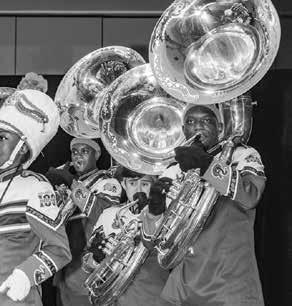
The purpose of the FMEA Collegiate Ensemble is to promote collaborative quality music participation during our 2023 FMEA Professional Development Conference.
Music selections include (1) Bruno Mars Medley, (2) America the Beautiful, (3) Do What Cha Wanna and Drum Line feature … arranged by Mr. Lindsey Sarjeant, FAMU Marching Band. All music parts will be distributed to those who register.
Each participant who registers by November 10, 2022, will receive a compli mentary T-shirt and music to practice prior to rehearsal on Thursday, January 12, 2023, at 8:00 am in the Tampa Convention Center, Ballroom A-B.
Dr. Mark Belfast, advisor of Florida NAfME Collegiate and chair of the School of Music at Southeastern University, will coordinate the ensemble, along with Ms. Allison Yopp, president of Florida NAfME Collegiate, and Dr. Shelby Chipman, FMEA president.
FMEA MUSIC TEACHER ENSEMBLE:
A concert-style ensemble made up of music teachers and directors will perform as part of the Friday General Session at the FMEA conference.
The purpose of the FMEA Music Teacher Ensemble is to promote collaborative quality music participation during our 2023 FMEA Professional Development Conference.
Music selections include (1) Amazing Grace (traditional/arr. L. Sarjeant), (2) Lift Every Voice and Sing, (arr. Roland Carter), and (3) Unity (Maria Corley/arr. L. Sarjeant, FAMU Marching Band. All music parts will be distributed to those who register.
Each participant is requested to wear ALL black attire for the performance. Rehearsals are Thursday, January 12, 2023, at 10:00 pm and Friday, January 13, 2023, at 8:00 am in the Tampa Convention Center, Ballroom A-B.
Dr. Jeffrey Redding, director of choral activities at UCF, and Dr. Lindsey Williams, music supervisor at Seminole County, will coordinate the ensemble, along with Dr. Shelby Chipman, FMEA president.
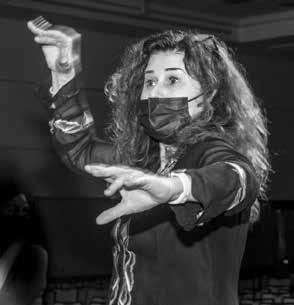
To register, visit FMEA.org/Conference November 2022 23 Continued on page 24
Often, people with perfectionistic ten dencies obsess over details to the point of burnout. Others find that their need for perfection prevents them from taking the initial first step in a task (“paralysis by analysis,” if you will). An alternative approach is to realize that sometimes just getting the job done is a success.
Many with IP have an unnaturally strong fear of failure and struggle when success is not achieved instantly. In addi tion, IP often manifests through constant comparisons to others. Therefore, anoth er helpful tool for overcoming IP is for successful individuals to publicly share their failures. To this end, failure resumés have recently gained popularity. Failure resumés summarize the times when things did not go to plan—when success was not achieved. When individuals with IP see the trial and error required to achieve success, it helps to temper their expectations of instantaneous success.
Want more information on IP?
Rest assured, if you are feeling like an impostor, you are not alone. In fact, many of the most successful people in your life may be feeling the same way. The good news is there are many resources avail able to learn more about IP and ways to overcome it. Consider visiting the web sites below for more information.
« https://paulineroseclance.com/ impostor_phenomenon.html
« https://impostorsyndrome.com/val erie-young/
Rachel Sorenson, PhD, is assistant professor of music education at Kennesaw State University in Kennesaw, Georgia. She holds degrees from Stetson University (2012) and Florida State University (2019, 2022). Her research interests include preservice music teacher education, mentor ing, and Impostor Phenomenon.
References
Bravata, D. M., Watts, S. A., Keefer, A. L., Madhusudhan, D. K., Taylor, K. T., Clark, D. M., Nelson, R. S., Cokley, K. O., & Hagg, H. K. (2020). Prevalence, predictors, and treatment of impostor syndrome: A systematic review. Journal of General Internal Medicine, 35(4), 1252–1275. https://doi. org/10.1007/s11606-019-05364-1
Clance, P. R., & Imes, S. A. (1978). The imposter phenomenon in high achieving women: Dynamics and therapeutic intervention. Psychotherapy: Theory, Research & Practice, 15(3), 241–247. https://doi.org/10.1037/ h0086006
Clance, P. R., & O’Toole, M. A. (1987). The imposter phenomenon: An internal barrier to empowerment and achievement. Women & Therapy, 6(3), 51–64. https://doi. org/10.1300/J015V06N03_05
Joshi, A., & Mangette, H. (2018). Unmasking of impostor syndrome. Journal of Research, Assessment, and Practice in Higher Education, 3(1), 1–8.
Sorenson, R. A. (2022). The prevalence of Impostor Phenomenon among music student teachers: A mixed methods approach [Unpublished doctoral dissertation]. Florida State University.
Young, V. (2011). The secret thoughts of successful women: Why capable people suffer from the impostor syndrome and how to thrive in spite of it (1st ed.). Crown Publishing Group.



24 Florida Music Director Raise your hand if your students are great at sight reading... • Integrations with Clever, Google Classroom, Canvas, Schoology & Classlink • Assess students with built-in Assignments feature & Practice Logs • Multiple levels of difficulty & customizable • Affordable - Teachers $35/year; student accounts as low as $2/ student Why use SRF: Go to sightreadingfactory.com/ fmea2 to activate a free trial with student accounts.* Sight Reading Factory builds confident sight readers with unlimited, on-demand exercises. SightReadingFactory.com *Terms & conditions apply Impostor Phenomenon Continued from page 23
Building Community: Your Voice Matters!
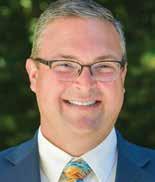
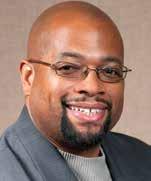
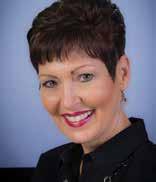

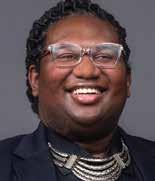
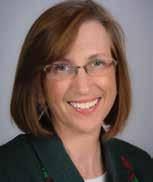
Do you remember who or what influenced your decision to become a music educator?
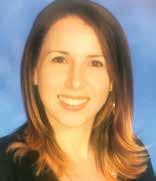
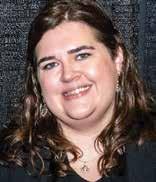

The noise of today’s news, politics, and social media can challenge your emotional health and cause you to lose sight of your why.
Participant interest will guide our facilitated discussions as we engage with teacher leaders throughout Florida to examine the current state of the profession, what led us to this point, and how we move forward with a renewed passion for music’s essential and vibrant role in the curriculum. This open and honest dialogue will be the catalyst for a plan of action to build camaraderie and to be a more inclusive professional community of music educators. FMEA values each member’s unique perspective, so come and let your voice be heard!
Presenters
PRE- CO N F ERENCE
2023 FMEA Pre-Conference Wednesday, January 11, 2023—1-5 pm
Ernesta Chicklowski
Beth Cummings
Bernie Hendricks Shelby Montgomery
Jeanne Reynolds
Ajori Spencer
Jeannine Stemmer
Scott Sheehan
November 2022 25
Professional Development Conference is one of the largest music education professional development events in the United States. In addition to approximately 250 clinic sessions and concerts, it is host to 23 all-state ensembles featuring Florida’s top band, orchestra, chorus, guitar, Orff, and
music students conducted by world-class conductors and teachers.
attended by more than 10,000 people, including secondary music directors, elementary music teachers, music supervisors, college students, college music teachers, school administrators, K-12 students performing in the all-state ensembles, students
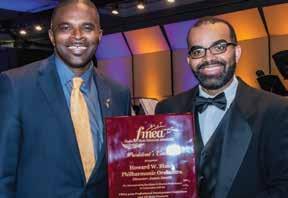

professional musicians
performing ensembles, exhibitors,
parents
with
family members
reasons to participate:
exhibit hall with world-class exhibitors providing products and services for music educators and students
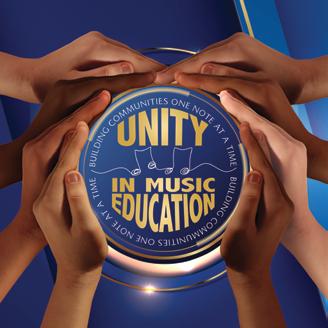
More than 2,800 music teachers and 200 administrators
More than 120 sessions, covering a variety of topics for all music educators, with on-demand access to recordings after the conference
Performances and mini-concerts from some of Florida’s top music programs
opportunities, college fair, awards ceremony, and other special events

26 Florida Music Director The FMEA
popular
It is
and
performing
invited
and
and
of performing students. We can’t wait to see you in Tampa this January! January 11-14, 2023 Tampa Convention Center, Tampa, FL UNITY IN MUSIC EDUCATION Building Communities One Note at a Time 2023 FMEA Professional Development Conference So many
« An
«
«
«
« Networking
Important Dates
November 12, 2022 Hotel room cancellation deadline at 5 pm EST
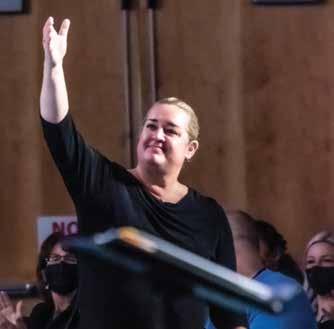
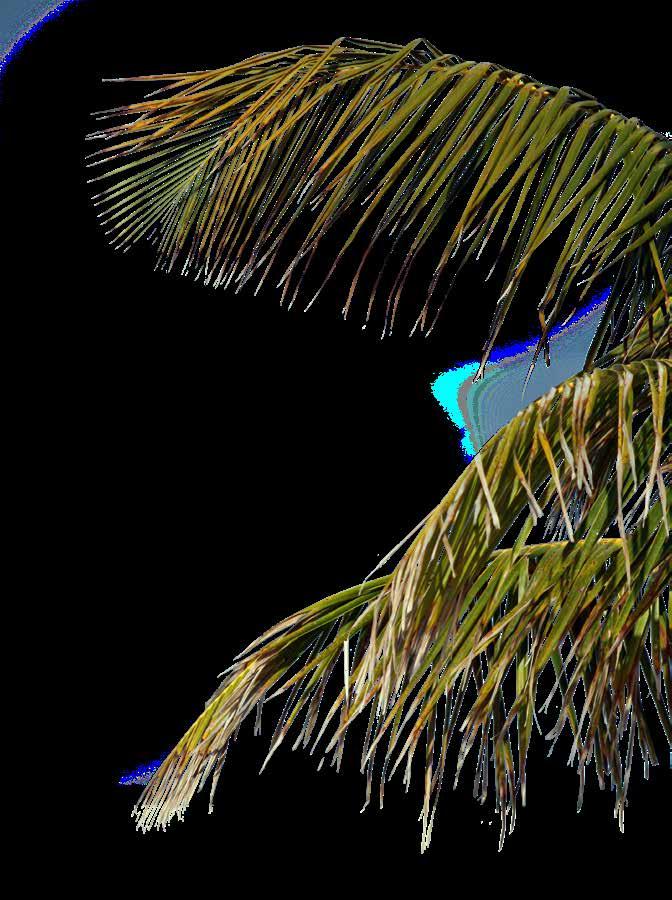
November 14,
December 11,
will charge your credit card a nonrefundable deposit for the first night of each room reserved.

Preregistration closes at 12 midnight EST. Payment must be postmarked on or before December 4 if you are paying by check. Preregistration is by credit card only after December 5.
December 12,
can begin the on-site registration process online to generate an invoice with the on-site prices, but you must bring your payment to the conference.
December 16,
school lodging checks are due, payable to the hotel where reservations were made for yourself and/or your students.
December 16,
final deadline for discounted hotel blocks. Unsold rooms in the FMEA blocks are released back to hotels.
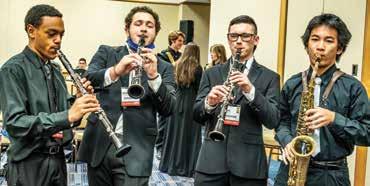

2022 Hotels
2022
2022 You
2022 All
2022 The
on
must be entered online, beginning September 17.
the end of the online form, you will have the opportunity to print an invoice
send in with a check until one week before the preregistration deadline or to pay online instantly with a credit card
the preregistration deadline.
assist
students, and chaperones as they
will have a
exhibit booths, all
encoded with contact infor mation. Attendees will be able to allow

to scan their badges rather than manually writing information on contact cards or mailing lists at their booths.
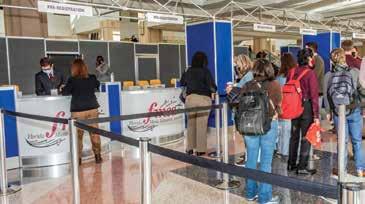
to maintain a positive relation ship with our exhibitors who can benefit your students through scholarships, new equipment, sheet music, software, and more, we ask that you please provide

MAILING
and EMAIL for each of your
and chaperones and do NOT simply enter your school address or other
information.
that
28 Florida Music Director Registration Fees Description Preregistration Rates: Sept. 17-Dec. 11 On-Site Rates: Director/Member $155 $200 Collegiate Member $70 $100 Retired Member $25 $25 Non-Teaching Spouse $100 $150 Non-Teaching Spouse of Retired Member $0 $0 Paid Chaperone $75 $125 Free Chaperone $0 $0 All-State Student $75 $125 Tri-M Student $50 $75 Preconference Workshop $75 $125 Preconference Workshop (First-Year Teacher) $75 $125 Student Experience – Student $50 $75 Student Experience – Chaperone $50 $75 To take advantage of early discounted rates, you must register and pay before the deadlines. Note: If you are mailing a check to the FMEA office to pay for your registration, it must be postmarked early enough so
it will ARRIVE in the FMEA office before the preregistration deadline. Membership in FMEA and NAfME is a prerequisite for registration. See the Registration Policies
our website for details. All registration information
At
to
until
Please Note: To
our members, their
visit
badges
barcode
exhibitors
In order
the ACTUAL, CORRECT
ADDRESS
students
incorrect
Registration
Registration Policies
1. All participants—directors, students, chaperones, and guests—must be registered for the conference.
2. Only directors may register their groups or pick up registration materials if preregistered.

3. All participating students must be chaperoned. As required by FMEA and FSMA, at least one chaperone other than a director is required for every ten (10) students or fraction thereof; however, FMEA policy allows for one free chaperone for every six (6) students or fraction thereof.
4. An additional paid chaperone may be registered for (a) each six (6) students registered or (b) for each all-state rehearsal site where registered students are performing.
5. If a participating student is not accompanied by the director from that student’s school, then the principal from that school must furnish a letter designating the person from the school or school district who is to be in charge of that student. The letter should be addressed to the FMEA executive director, must explain the extenuating circumstances preventing the director from attending, and must be submitted with registration materials. The school will be notified of approval.
6. Student observers are not allowed to attend the conference. If any student observers are brought to the conference, the offending school’s participation in the conference may be eliminated the following year. (Tri-M students registered and participating in sessions or working for the all-state concerts are exempt from this rule.)
7. All school music teachers must register for the conference as FMEA directors and must be current members of the FMEA. This includes directors of invited performing groups or mini-concerts, and session presenters. All-state conductors from Florida schools, colleges, or universities must also be FMEA members. No current music teacher may register as a chaperone.
Refund Policies
1. Full registration refunds are available for cancellation requests made through December 15, 2022.
2. No registration refunds will be made for cancellations made after December 15, 2022, except for emergency situations. These will be reviewed on a case-by-case basis.
3. Refunds must be requested in writing (email is acceptable).
4. All requests for refunds must be received no later than January 31, 2023. Requests received after that date will not be processed.
5. All refunds will be issued after the conference is completed.
6. There are no refunds for concert tickets.
Chaperone Registration
Chaperone registration is based on the following rules: Elementary Students
« For each elementary student registered, one free chaperone and one paid chaperone may be registered.
« Any additional attendees must purchase a guest pass at on-site registration for entry into the convention center.
Middle School and High School Students
« For every six (6) students registered, one free chaperone and one paid chaperone may be registered. No other chaperones may be registered until the seventh student is registered.
« Any additional attendees (chaperones or guests) must purchase a guest pass at on-site registration for entry into the convention center.
« Exceptions
• If you have students in more than one performing ensemble, you may pay for a chaperone for each performing ensemble in which you have registered students.
• If you have students from different schools, you may pay for a chaperone for each school for which you have registered students.
Chaperones are not allowed to bring other children who are not participating in an all-state ensemble Only registered students, teachers, and chaperones wearing a conference badge are allowed in and around the rehearsal areas. Directors are asked to make sure their chaperones are aware of this policy before agreeing to serve as a chaperone.
November 2022 29
Hotels
Greetings! It’s that wonderful time of year when we start planning our very special conference event. The Florida Music Education Association has contracted the following Tampa hotels for the January 11-14, 2023, Professional Development Conference. Please telephone your hotel of choice directly from the list below beginning Sept. 24, 2022, at 9 am EDT. Guest rooms at the contracted rates are available until the room block is full or until the cancellation deadline of Nov. 12, 2022, at 5 pm EST. If your hotel of choice is sold out, please continue to try to make a reservation until Nov. 12, 2022, as FMEA attendees will periodically release surplus guest rooms.
A maximum of five (5) guest rooms may be reserved per teacher or parent. Each and all rooms reserved on Nov. 14, 2022, will be charged a non refundable, one-night fee to the respon sible credit cardholder. (Invalid credit cards risk reservation cancellation.)
We urge any guest holding surplus reservations/rooms to cancel excess reservation(s) as soon as possible and no later than 5 pm EST on Nov. 12, 2022, and you must secure a cancellation confirmation number. (This courtesy will make surplus rooms available to other guests.) In order to receive compli mentary rehearsal and meeting space, you should book guest rooms in the hotel you are using for your group functions.
NOTE: FMEA IS NOT offering a housing bureau service. All participants MUST call the hotels directly beginning Sept. 24, 2022, at 9 am EDT to request the “Florida Music Education Association” room block rate and confirm the guest room rate listed on the next page. We look forward to seeing you in Tampa!

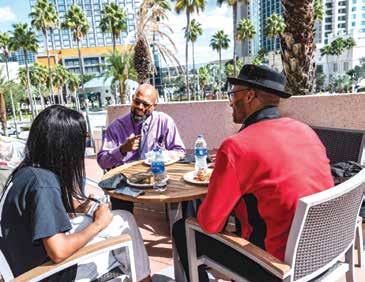


30 Florida Music Director
Contracted Hotels
HOTEL RESERVATIONS – Cutoff date: 11/12/22 ROOM RATES
Single
Barrymore Hotel Tampa Riverwalk
111 West Fortune Street, Tampa, FL 33602 Comp. internet & self parking
Courtyard by Marriott Downtown Tampa 102 East Cass Street, Tampa, FL 33602 Comp. internet; $30 valet only
Embassy Suites Downtown 513 South Florida Avenue, Tampa, FL 33602 Comp. internet & breakfast; $24 valet only
Embassy Suites Tampa Airport Westshore 555 North Westshore Blvd., Tampa, FL 33609 Comp. internet, self-parking, & breakfast
Four Points by Sheraton Suites
Tampa Airport Westshore
4400 West Cypress Street, Tampa, FL 33607 Comp. internet & shuttle to Tampa airport; $10 self parking
Hampton Inn Tampa Downtown Channel District 1155 East Kennedy Blvd., Tampa, FL 33602 Comp. internet & breakfast; $22 self parking
Hilton Downtown 211 North Tampa Street, Tampa, FL 33602 $9.99 internet (Comp. for HH); $35 valet only
Home 2 Suites Tampa Downtown Channel District
1155 East Kennedy Blvd., Tampa, FL 33602 Comp. internet & breakfast; $22 self parking
Sheraton Tampa Riverwalk Hotel
200 North Ashley Drive, Tampa, FL 33602
Comp. internet; $36 overnight valet; $20 daytime valet
Tampa Marriott Water Street Hotel (formerly Marriott Waterside)
505 Water Street, Tampa, FL 33602
Comp. internet for Bonvoy members; $33 overnight valet; $23 daytime valet
Westin Tampa Waterside
725 South Harbour Island Blvd., Tampa, FL 33602
Comp. internet; $30 valet only
(813) 223-1351 #1 for reservations Group Code: FMEA $156 $156 $156 $156
(813) 229-1100, ext. 1 Group Code: FMEA $169 $169 $169 $169
(813) 769-8300 #1 Group Code: FM3 $264 $264 $274 $284
(813) 875-1555 #2 Group Code: FME or FMEA 2023
$203 $203 $213 (up to 5 in room) $223 (up to 6 in room)
(800) 368-7764 Say “Associate” No cell text reservation link Group Code: FMEA $148 $148 $148 $148
(813) 525-9900, ext. 1 Group Code: F23 $199 $199 $199 $199
(800) 445-8667, ext. 1 Group Code: FMEA

(813) 525-9900, ext. 2 Group Code: FM3
(888) 627-8105 #1
Say “Associate”
No cell text reservation link Group Code: FL3
(888) 789-3090 #1 Group Code: FMEA
(800) 937-8461
Say “Associate” Group Code: FMEA
$227 $227 $227 $227
$224 $224 $224
$229
$249
$211 $211
$217
November 2022 31
Double Triple Quad
$224
$229 $249
$211 $211
$217 $217 $217
2023 FMEA Professional Development Conference January 11-14, 2023 Tampa Convention Center, Tampa, FL
Personal Health and Safety
Security Procedures
The Florida Music Education Association is working with the Tampa Police Department and Allied Security at the Tampa Convention Center (TCC) to enhance the confer ence experience for the students and attendees.
Great News!
In order to help keep attendees safe, there will be a heightened security presence throughout the TCC and at various hotels. All entrances to the TCC will be patrolled by uniformed officers of the Tampa Police Department and uniformed Allied Security person nel. They will be patrolling the TCC as well. The Tampa Police Department will be at the crosswalks between Marriott Tampa Water Street and the TCC, at concerts, and patrolling some of the downtown hotels during rehearsals.

All attendees (this includes members, exhibitors, chaperones, and student participants) must wear their conference badge during the conference once the authorized registrant obtains the conference packet.
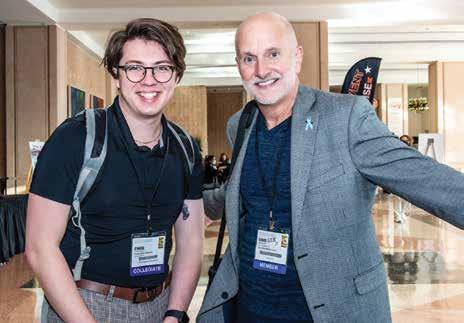
Please be prepared for random bag and/or purse searches. It is encouraged, if at all possible, to use a clear bag, similar to those used at sporting events, for entrance.
Enjoy the Conference Experience.
Releases
Health Risk Acknowledgement
By registering for this event, I hereby acknowledge that I fully understand the nature and extent of the risk related to the COVID-19 virus and other contagious diseases and agree that by attending this conference and any related events, I do so at my own risk. Additionally, I expressly acknowledge the following:
« infection by COVID-19 can result in death;
« COVID-19 is highly contagious; « the risk of infection and transmission are higher in indoor facilities;
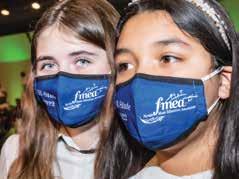
« there are no safety precautions that totally eliminate the risk of contract ing COVID-19; and

« individuals with various underlying medical conditions may experience worse outcomes.

Information about the precautions we are taking is posted on our Health Information Page on our website.

Photography/Videography
By registering for this event, I hereby grant permission to use any and all photo graphic imagery and video footage taken of me at this event and activities pertain ing to this event, without payment or any other consideration. I understand that such materials may be published electron ically or in print, or used in presentations or exhibitions.
32 Florida Music Director
Concert Tickets
All Concert Ticket Sales Are Final. No Refunds or Exchanges.

Please make sure you know the exact name of the all-state ensemble for which you need tickets before approaching the ticket sales window.
1. Registered (BADGED) attendees do not require tickets to attend any all-state concert. This includes directors/members, directors’ non-teaching spouses, performing all-state students, registered chaperones, collegiate student members, retired members, and VIP guests that you entered as part of your conference registration.
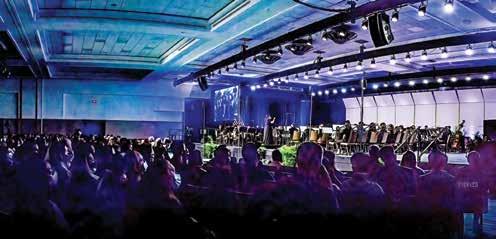
2. All nonregistered (NONBADGED) attendees (parents, family members, guests, etc.) are required to purchase tickets for any all-state concert they wish to attend at $20 per ticket.
3. There are no “free” or “allotted” tickets. All concert attendees must either wear their conference badge or purchase a ticket.
4. Directors who preregister online may reserve and prepay for all-state concert tickets for nonregistered attendees for concerts in which they have registered all-state students. If paid for online, these tickets will be preloaded into the director’s registration package.
5. Directors who register on site may purchase all-state concert tickets for nonregistered attendees for concerts in which they have registered all-state students during the on-site registration process.
6. Directors with all-state students may purchase additional concert tickets for nonregistered attendees for concerts in which they have performing students at the on-site registration desk or at a designated ticket sales location at anytime.
7. General ticket sales for all-state concerts will begin at 11 am on Thursday at the FMEA registration desk. There is no requirement that the director or any other registered attendee be the person purchasing these tickets after this time.
8. All ticket sales are final. Concert tickets are nonrefundable.
9. For entrance, ticket, and concert purposes, a concert is defined as the group of ensembles that are performing in the same venue in a common, defined block of time. An example of a “concert” for purposes of entrance, ticketing, etc., is the 6 pm concert on Saturday for the All-State Middle School Band, the All-State Concert Band, and the All-State Symphonic Band.
NOTE: No concerts will be held at the Straz Performing Arts Center.
Frequently Asked Questions
Do I get free tickets for my students’ family members to attend the concert?
No. You can pre-order and pay for their tickets when you preregister for the concert, but there are no free tickets.
Can I get free tickets to any concerts?
No. Registered attendees (directors, chaperones, students) are allowed admission to concerts with their name badge, so no ticket is necessary. Attendees that are not registered for the conference (parents, family, etc.) must purchase tickets.
Can I buy extra tickets anytime?
If you are an FMEA member registered for the conference, you may purchase tickets at the computers in the on-site registration area anytime during the regular registration hours. Everyone else may purchase tickets beginning at 11 am on Thursday.
There are more family members and guests coming to watch my all-state student than I have tickets. How and when do they get tickets?
Extra tickets may be purchased when general ticket sales open. Tickets will be sold at the main registration area and cost $20 each.
Does my young child need to buy a ticket?
Everyone who will be taking up a seat will need a ticket. Babies that are being held by a parent or sitting on a parent’s lap for the duration of the concert are welcome without a ticket, but children who are old enough to sit in their own seat will need a ticket.
November 2022 33
All-State Rehearsal Locations

All-State Concert Band Sheraton Riverwalk
All-State Concert Chorus Tampa Marriott Water Street
All-State Concert Orchestra Tampa Marriott Water Street
All-State Elementary Chorus Tampa Convention Center
All-State Elementary Orff Ensemble Tampa Convention Center
All-State Guitar Ensemble Tampa Marriott Water Street
All-State High School Jazz Band Tampa Convention Center
All-State Intercollegiate Band Barrymore Hotel Tampa Riverwalk
All-State Middle School Band Hilton Tampa Downtown
All-State Middle School Jazz Band Westin Tampa Waterside
All-State Middle School Mixed Chorus Hilton Tampa Downtown
All-State Middle School Orchestra Tampa Marriott Water Street
All-State Middle School Treble Chorus Hilton Tampa Downtown
All-State Popular Music Collective Tampa Convention Center
All-State Reading Chorus Embassy Suites Downtown
All-State SSAA Chorus Westin Tampa Waterside
All-State Symphonic Band Tampa Convention Center
All-State Symphonic Orchestra Tampa Convention Center
All-State TTBB Chorus Embassy Suites Downtown
High School Honors Band Sheraton Riverwalk High School Honors Orchestra Embassy Suites Downtown
Middle School Honors Band Hilton Tampa Downtown Middle School Honors Orchestra Sheraton Riverwalk
34 Florida Music Director

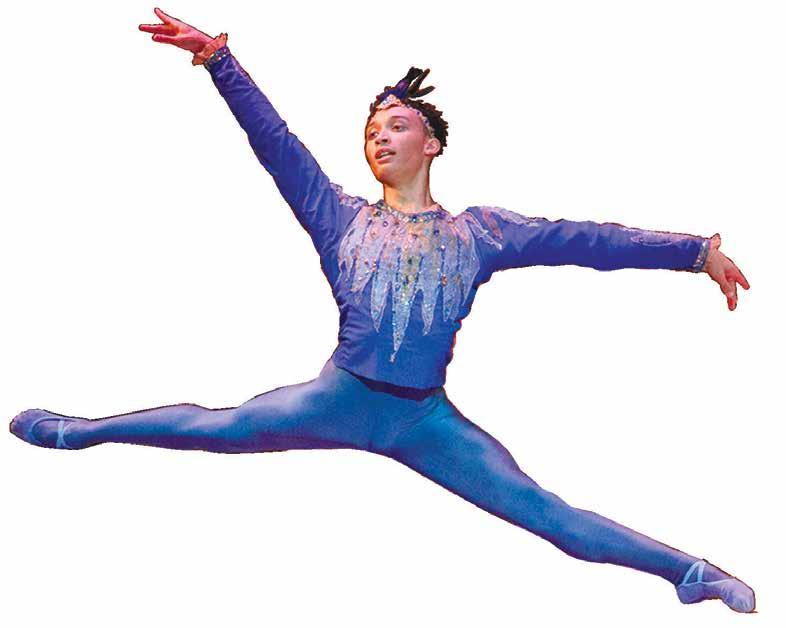
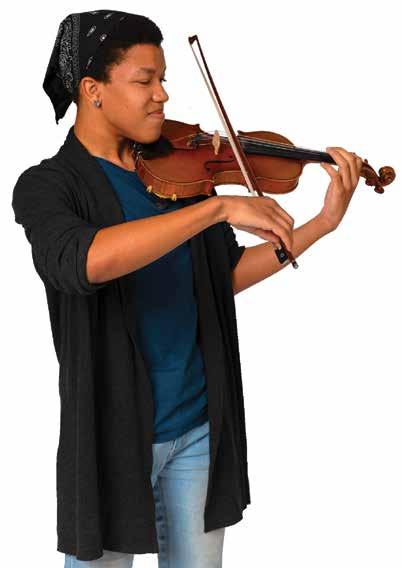
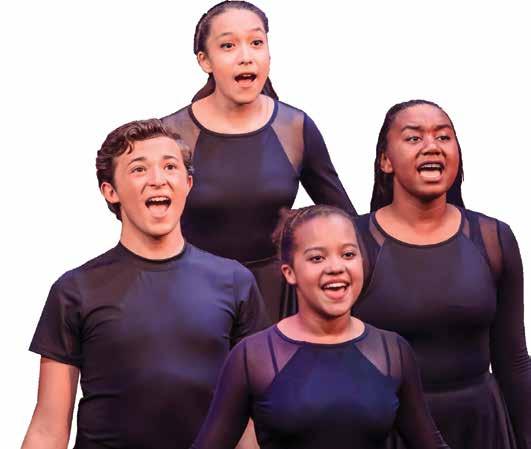
November 2022 35 DANCE DANCE THEATER THEATER MUSIC MUSIC SCHOOL-YEAR CLASSES REGISTER TODAY! DREAMIT. DREAMDOIT IT. DOIT PATELCONSERVATORY.ORG • 813.222.1040
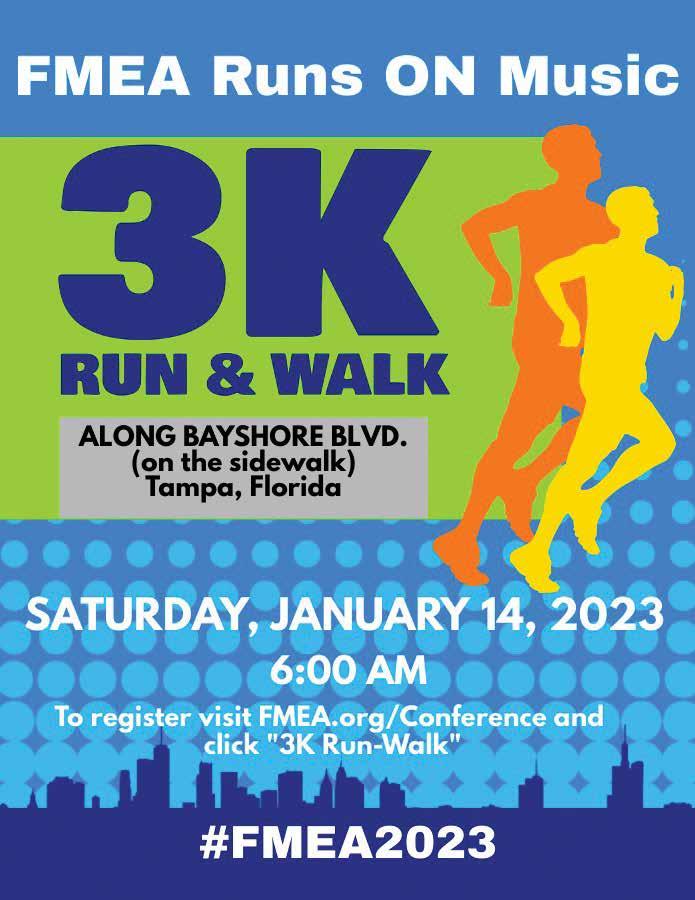
36 Florida Music Director
STUDENT
PERIENCES
Student Leadership Session
Wednesday, January 11, 2023, 1-4:30 pm
Presenter: Anne M. Fennell, MEd
In It to Win It, for Everyone!
This workshop is designed for all high school student leaders who want to learn, thrive, and become the best leader for their schools, peers, and themselves. Attendees will participate in active conversations and team and relationship building activities while also discovering their personal strengths and needs to continue to grow on their leadership journeys. Everyone will be engaged in a culture of inclusivity to see and hear all students whle revealing the unique strengths and knowledge of our combined voices and experiences.
Tri-M Conference Experience
The purpose of the Florida Music Education Association


Tri-M Conference Experience is to provide students with experiences that will build their leadership and advocacy skills, as well as expose them to the experiences available at the annual conference.
Participating students will interact with amazing clinicians and educators, college representatives, and incredible performing groups. These students will have memorable experiences they can take back and share with their high school music programs.
Student Conference Experience
Thursday, January 12-13, 2023
Presenter: Anne M. Fennell, MEd
The purpose of the Florida Music Education Association Student Conference Experience is to expand access to the annual conference to students from throughout the state. Participating students will interact with amazing clinicians and educators, college representatives, and incredible performing groups. These students will have memorable experiences that they can take back and share with their high school music programs. The program will take place on Thursday and Friday of the 2023 FMEA Professional Development Conference. Students will participate in workshops, observe rehearsals, attend College Night, and engage in networking and social activities with their peers.
Anne M. Fennell, MEd, is the president of the California Music Educators Association and the K-12 music program manager for San Diego Unified School District in San Diego, California. She holds the BME, the MEd in educational leadership studies, and Orff-Schulwerk certification Levels I-II-III, and has more than 90 graduate hours in music and additional education course work. Her experiences include 32 years of teaching music composition and steel drum ensembles in grades 9-12, teaching K-8 integrated arts and music through Orff-Schulwerk, and leading both vocal and instrumental ensembles in civic and profession al performances, including national music conferences and the annual NAMM Board of Directors’ meetings in 2013 and 2016. She is a published author through Pearson
Education, the GRAMMY Foundation, the Percussion Marketing Council, and Disney’s Little/Baby Einsteins. She presents sessions and gives keynotes both nationally and internationally, including state MEAs, the American Orff-Schulwerk Association, the National Association for Music Education, the Organization of Economic Cooperation and Development, China music education confer ences (through the support of the International Music Products Industry (NAMM)), and the International Society for Music Education. She has received numerous state and national awards: the 2020 Technology in Music Education National Teacher of the Year, 2017 Magnet Schools of America National Teacher of the Year, top 10 GRAMMY Music Educator Finalist for 2016, and top 3 Music Educator Award from Music and Arts in 2015.
November 2022 37
E X
FMEA now offers two experiences for high school students who are not participating in an all-state ensemble, the Student Conference Experience and the Tri-M Conference Experience Read the comparison here
A

Program
Fred Schiff, Chairperson
After meaningful discussions with our part ners at Hal Leonard, the Florida Corporate and Academic Partners Committee (FCAP) is thrilled to announce that three incredible sessions featuring three of the best educators in world will present on Friday at the 2023 FMEA Professional Development Conference. In a nutshell, FVA, FOA, and FBA were asked for a short list of names they wanted their members to see, and Hal Leonard made it happen. It is my pleasure to announce that Dr. Matthew Arau (FBA), Dr. Rollo Dilworth (FVA), and Dr. Robert Gillespie (FOA) will be in Tampa in January to address our members.
These Pilot Program sessions, though funded by Hal Leonard, are not about the products they sell.
This is an ideal partnership, whereby each presenter will be offering music teachers additional tools to face the issues they encounter in and out of the classroom, allowing all of us to improve.
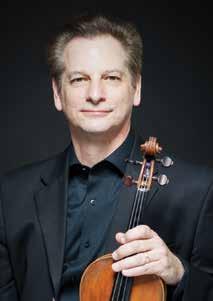
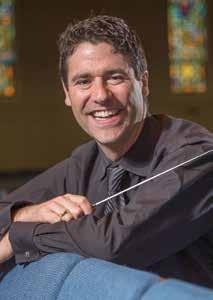
As I have stated before, the quality of the music business community is dependent on quality class room teaching, and it is our intention to make sure all of our communities grow and flourish.
If you are a Corporate or Academic Partner that has an idea on how you can help any of our FMEA compo nents and would like to be seen on another level for the 2024 conference, then please contact me. I look forward to our conversations.
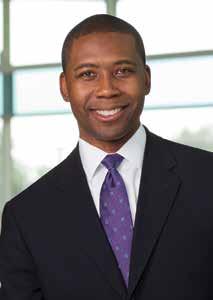
 FLORIDA CORPORATE & ACADEMIC PARTNERS
FLORIDA CORPORATE & ACADEMIC PARTNERS
COMMITTEE
PILOT PRO G RAM
Dr. Matthew Arau
Dr. Rollo Dilworth
Dr. Robert Gillespie
Pilot
First for the 2023 FMEA Conference 38 Florida Music Director Renew your partner membership TODAY! For more information, call 850-878-6844 email info@flmusiced.org visit FloridaMusicEducation.org/partners
Florida



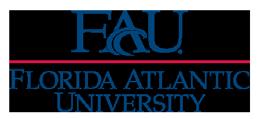

GOLD PARTNERS
Partners
University
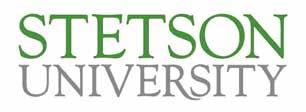


November 2022 39
as of October 17, 2022. *Please visit FMEA.org/partners for partnership details or call 850-878-6844.
Southern College Rollins College Department of Music St. Thomas University
of North Texas University of Tampa Please take time to thank and support our 2022-2023 Academic Partners. BRONZE PARTNERS
Keep tending the fire!

Recruiting and Maintaining Performing Ensembles Post-Pandemic
by John A. Lychner, PhD
TThroughout the pandemic, we have all been searching for ways to engage students in performance experiences, try ing to “keep the fire burning.” The “fire” I refer to here is our passion for performing ensembles, including orches tra, choir, band, and others. Just like a well-built and well-tended campfire, our schools’ performing ensembles were burning brightly with our passion to perform in our established traditions. Then, like a summer thunderstorm, the pandemic hit and our fire was struggling to stay lit. Even without a storm, we know that when we have a campfire that is burning brightly, it remains a strong blaze only when it is tended. Over the years we have developed a wide range of recruiting and retention strategies to maintain the momentum of our performance programs. We have tended the fire! However, the pandemic brought with it new challenges that required us to operate in ways that did not even begin to reflect our long-running

November 2022 41 Continued on page 42 tending
Keep tending the fire
traditions. We met those challenges, but we also learned that nothing equaled the experience of performing live and together. So, now, as we’re coming out of the pan demic and beginning to construct a new normal with live performing and new tools that resulted from our work during the pandemic, it is important both to revisit triedand-true approaches to recruiting and retention so we can update them to fit our current situation and to seek out new approaches that fit our new situations. We must tend the fire that has been challenged by severe weather, keeping the spark alive and adding new fuel to reach a full blaze.
Throughout the pandemic, I kept in touch with col leagues and former students from across the country who were experimenting with a wide variety of meth ods to keep their students engaged. I heard numerous stories describing new approaches and new takes on old approaches they were trying in their programs. It was a truly creative time, a time when successful directors did not say things like “______ will never work” but rath er “let’s try ______.” There was a new level of analysis regarding what engages students coupled with a new level of resolve that our music-making is far too important to let fall by the wayside in education.
The Foundation
Regardless of any factors we might traditionally use to categorize ourselves and our work (age of the students, type of ensemble, location of the school, etc.), I consis tently heard directors talking about the following things as basic or foundational to any success they were experi encing:
« Safe space – It is important to consciously create a space, whether physical or virtual, where the students feel comfortable, valued, accepted, and free from dis crimination or harassment.

« Stability – The environment we create must have a firm foundation of rules and procedures that are con sistently followed.
« Accountability – It is important to hold students and ourselves accountable to established expectations. These may be different from group to group, but they should be clearly defined by and for the group.
« Flexibility – It is important to be flexible because rigidity often leads to failure. We know this is true for physical structures that must have some level of flexi bility to withstand storms and earthquakes. However, we often miss the fact that the same need for some level of flexibility is present in the work we do.
« Don’t neglect basics—Listen and adjust – This includes basics like characteristic tone quality, technical accu racy, posture, breathing, vowel formation, bow tech nique, sticking, etc. Don’t allow things like a mask or a shield to change the musical outcome. Remain true to the music. Get the characteristic sound!
« Focus on success – Deal with mistakes, but don’t dwell on them. Find and reward every possible success, every step forward. Choose music that will include challenges while ultimately resulting in a perfor mance where everyone feels successful because of the way the director and the ensemble approached the rehearsals and the performance through positive mastery learning.
« Be creative and allow the students to be creative – Be sure everyone is seen as an integral part of the path forward and able to contribute in meaningful ways beyond merely singing or playing the right notes and rhythms.
« Be positive and grateful – Don’t take any day or even a single rehearsal for granted. Celebrate every chance to make music together!
42 Florida Music Director
Continued from page 41
While we all can agree that virtually nothing in this list is new, the fact that successful directors have been consistently saying these things during the pandemic, “rehearsing” them in a way, is interesting and import ant. It demonstrates that our mindset, our attitude, and our resolve make a huge difference in our outcomes. Successful ensemble directors set a strong and solid foun dation in the ways they approach the things listed above by being mindful and not taking these things for granted. Students are drawn to this foundation as much as to the music-making.
Recruiting and Retention
As I was listening to colleagues who are finding success, I noted that some of the most successful approaches came to the fore in several places at once. I was reminded of inventors like Thomas Edison and Nikola Tesla who developed nearly identical things when working virtually isolated from each other. When it comes to recruiting and retention, I have been impressed by the creativity I have heard about. Everything presented here was reported by more than one director.

With regard to recruiting, all of the basics still apply— advertising, meeting, involving current students, and performing. However, these basics take on a new feeling with new technology and current situations. Advertising is no longer a poster in the hall or an announcement over a loudspeaker. Those things can and should be included, but with the ability to produce high-quality visuals and videos, traditional publicity approaches are a part of a larger package with incredible impact through email and social media that can include embedded video and audio. Even traditional posters can include a QR code that takes the students and parents to documents or websites with engaging visuals as well as high-quality audio tracks and videos. These initial contacts lead to group meetings of various sorts, whether traditional in-person or via Zoom, Teams, or other platforms. In the past, these meetings were static and time sensitive, but today they are much more flexible and, if we allow them to be, can engage more students and parents. During these meetings it is import ant to include current students to demonstrate what involvement in the ensemble or program looks like. In fact, some of the most successful meetings have been near ly totally student led and/or produced. This is counter to tradition where the director has been the primary speak er. Note that the director is not turning things over to the
students and stepping back, but rather involving them so they are in their own way “rehearsing” their beliefs in the value of the performing experience. This functions to deepen those beliefs in the students and helps them find appropriate ways to verbalize and actually incorporate them in what they do. All of this will help lead to what is often the most important recruiting tool, performing. Choice of repertoire is particularly important here, once again involving the students in choosing the program and having them suggest times and venues—live and recorded, both audio only and video with audio. These performances, whether live for a school assembly, outside of class times, for a single class, or recorded and presented on video monitors during passing time or lunch, should demonstrate that performing is fun and something that is approachable.
Once students join an ensemble or program, keeping them involved over time is critical. Several things that ensemble directors have reported being particularly effec tive include increased parental involvement, reinforce ment of procedures, being in person whenever possible, programming appropriately, and increased individual ized and small-group instruction.
Regardless of the kind of ensemble, it is beneficial to get the students to engage with their parents when they get home each day by explaining what they learned, including demonstration and singing or playing, similar to what is standard in the Suzuki method. This requires
November 2022 43 Continued on page 44
Keep
the student to remember and review what they did in rehearsal while increasing the parents’ understanding of and appreciation for music education, not to mention building the family bond. The importance of reinforcing procedures has already been mentioned, but I heard it reported so often as a reason that successful programs have survived and rebounded that it bears repeating here. Students crave stability, but there was almost noth ing stable during the pandemic, so consistency in daily procedures provides an incredibly important foundation for retention, whether working in person or remotely. However, I think the pandemic experience has made it clear to all of us that working in person is always going to be a better musical experience, positively affecting reten tion. As with procedures, choosing music was already discussed but is repeated here because of the number of times I heard it mentioned in recent months. It has always been important to choose quality music that is at an appropriate level for the students. The difference now is how the choice is made. Engaging students in the process of choosing music and even in designing the program for each concert produces a buy-in to the work that will have to be done to prepare and perform the music. The director will obviously guide the process of researching and choosing the music with the students prior to begin
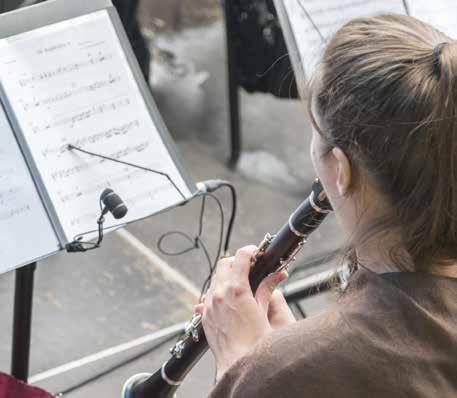
ning rehearsals, but as a result of this extra engagement, the students will have ownership and usually will work harder. Student engagement, positive daily experiences with noted progress, and successful outcomes are critical to retention.
These important reminders and potentially new approaches to retention were enhanced by several unique approaches to individualized and small-group instruc tion. All of these require some extra preparation by the director, but the potential dividends have been demon strated to be huge. With regard to individualized instruc tion, I found three approaches particularly interesting. The first is based on Recorder Karate, a common part of the elementary music classroom, but here adapted for middle school and high school ensembles. This involves the director choosing musical examples that represent key skills and/or knowledge that each student must acquire during the semester and then providing some kind of recognition or award for demonstrating mastery of each, like the “belts” added to the recorder. This can be expanded beyond the individual to include sections competing to see which successfully completes all of the examples first. Obviously the director can be creative in how they manage this to make it fun and rewarding based on what works for their students. The second is simply providing recorded examples of individual parts for students to practice with outside of rehearsal. Technology allows us to do this with much greater ease than in the past. When done by strategically choosing sections of the music to record, this assists the students with some difficult passages but then requires them to apply what they have learned to other parts of the music or other tunes. Correctly transferring the skill or knowl edge demonstrates mastery and understanding. The third is employing a “lead sheet” for instrumentalists. Vocalists already have this because they see all parts in their music whereas instrumentalists only have a single line on their part. Providing a lead sheet that functions like a mini score, indicating when various parts have the melody, counter melody, and important accompanying figures in relation to the part being played by each instru ment, provides valuable insights into how each part fits into the whole. Highlighting the function of individual parts, whether in choir, band, or orchestra, is important and can be a very beneficial visual aid. Note that just because choirs have all of the parts doesn’t mean they discuss how each part functions or encourage sections
44 Florida Music Director
tending the fire Continued from page 43
to look beyond their own line. So, providing individual musicians, instrumentalists, and vocalists with the big picture and working through it with them helps them to understand their value as a member of the ensemble. Students will want to continue to be a part of a group in which they feel valued, whether because of accom plishing performance objectives in fun/creative ways or because of interesting practice and performance aides that are provided to ensure their success in performance.
In addition to these individualized options, I heard of some small-group instruction options that are extensions of small-ensemble work that we often focus on once a year for MPA. One was designed as a club activity and started as a Christmas Carol Club that met after school, but it was so popular that it expanded to all holidays throughout the year. The students choose who will be in their small ensemble and the Christmas carol (or appro priate holiday tune—Valentine, Easter, etc.). Then they consult with the director, write the arrangement for their voice parts or instrumentation, and perform the piece or pieces. Another approach was similar but focused on more traditional chamber music, encouraging students to form their own ensembles, choose a chamber work in consultation with the director, and creatively arrange the music, whether for different voice parts or instrumenta tion than the original composition or in some different form or format. Then, like with the club activity, they determine appropriate performance venues. Several of these small groups can perform on the same program, or each group can develop their own repertoire of tunes. They can perform as people gather for events, during intermissions, or as a featured part of any gathering. With this kind of small-ensemble program functioning throughout the school year, there will always be one or more groups prepared to perform for any opportunity that presents itself. Of course, for MPA the ensembles will be required to follow the established rules, choosing the makeup of the ensemble based on the requirements of the music, in most cases foregoing the creative compo nent of arranging and, possibly, composing. The director will need to provide a structure and continually monitor the small-ensemble program for quality control, but the majority of the work will be done by the students who will have ownership in both the process and the product. They will develop independence, and that will trans late into better outcomes in large-ensemble work. I was reminded numerous times that a strong small-ensemble
program is beneficial both in regard to improved overall musicianship and retention as a result of students’ invest ment in the program.
General Maintenance
A performing ensemble or a performance program is built on relationships. We develop those relationships over weeks, months, and years. Often students work with the same director for three or more years. They choose to be in the program for a variety of reasons, including the music-making, the social aspects of the experience, and the director’s leadership. The successful directors I heard from often noted that as we come out of the pandemic, it is especially important that there are opportunities to build community through shared experiences, both musical and nonmusical. It is also important that everyone in the group feels valued and believes they can succeed and contribute to the music-making in a meaningful way. So, just as we check in on musical progress via playing tests or other assessments, we need to check in on personal well-being through various activities. Many directors are setting aside time for group discussions, small and large, or have their students write daily journal entries at the beginning or end of rehearsal. The most successful versions of these exercises have specific parameters and clear instructions to keep everyone focused and to allow all to participate as they deem appropriate. We are not counselors, and we need to know when the situation calls for professional assistance. However, directors whose
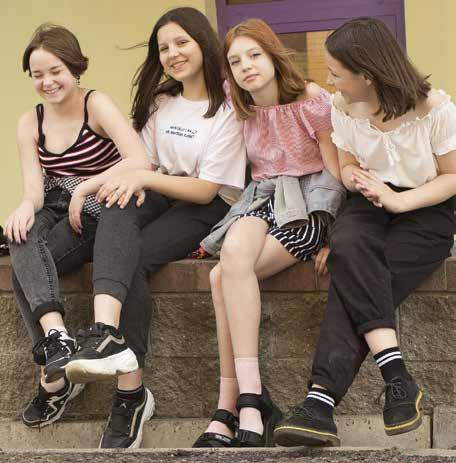
November 2022 45 Continued on page 46
Keep tending the fire
programs are bouncing back more quickly have found ways to nurture healthy relationships in their ensembles so that everyone feels valued and heard, and feels like a part of the successful outcome.
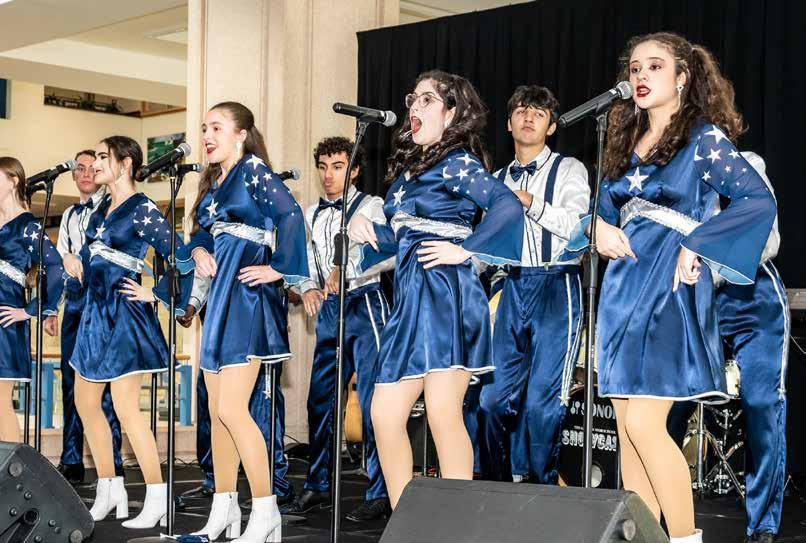
Conclusion
To successfully move forward as we come out of the pan demic, we must continue to be observant and creative. We must provide a safe space for all students where positive relationships are nurtured and there is stability as a result of established procedures and accountability. Then, with this foundation established, we can focus on meaningful music-making. Sharing the successful out comes of this healthy approach through both traditional and enhanced recruiting approaches will draw more stu dents to the program, and the engaging opportunities for music-making, personal growth, and community-build ing that are part of the normal workings of the program will keep students involved over time, especially those that include student leadership and input. As a result of
the incredible disruption that resulted from the pandem ic, we may have to work a little harder to establish our new normal or, better still, our new approach. However, we have more tools than ever at our disposal, and we have the opportunity to be creative and establish new or better things rather than simply putting what we had back in place. We have the opportunity for a new begin ning through which we reimagine music education with an eye to the future rather than a focus on the past. Let’s reinvigorate our passion for performing ensembles with a new vision and then carefully tend that fire!
John A. Lychner, PhD, is director of music education in the School of Music at Stetson University and is an active clinician/conduc tor. Previously, he was professor of music in the School of Music at Western Michigan University, Kalamazoo. Dr. Lychner taught band, choir, and general music in St. Louis, Missouri, and Tallahassee, Florida.

46 Florida Music Director
Continued from page 45
ResearchPuzzles FOR MUSIC TEACHERS
William I. Bauer, PhD FMEA Research Committee Chairperson, University of Florida

This on-going column seeks to stimulate awareness of research issues for FMEA teachers and researchers.
Teaching to the Standards in Large Ensembles
In 1994, as part of a larger standards-based education move ment in the United States, the Music Educators National Conference (now National Association for Music Education or NAfME) published the National Standards for Music Education (MENC Task Force for National Standards in the Arts, 1994).
After 20 years, these standards were updated and revised by music teachers from PK-12 and higher education, resulting in the National Core Arts Standards (NCAS), which include specific music standards (National Coalition for Core Arts Standards, 2014). The NCAS, released in 2014, are grouped into four categories that represent the artistic processes common to all of the arts—creating, performing, responding, and connect ing. The music standards are further organized into strands, which include PK-8 general music, composition/theory, music technology, guitar/keyboard/harmonizing instruments, and ensembles. While these national standards are voluntary, at least 28 states have adopted them, which makes them a required part of the professional lives of music educators in those states (National Coalition for Core Arts Standards, 2019).
A group of music teacher researchers (Harney et. al, 2022) were interested in learning about middle and high school ensemble teachers’ perspectives on addressing the 2014 stan dards with their students. To do so, they recruited 306 music teachers from across the country to participate in a research study. All participants completed a survey that was composed of questions that collected information related to their experi ences with teaching to the standards in terms of their (a) train ing, (b) interest, (c) ability, (d) sense of responsibility, (e) knowl edge of resources, (f) need for assistance, and (g) perception of available time. In addition, one participant from each state was selected for a follow-up interview to delve more deeply into their survey responses.
Findings
All of the study participants indicated they were familiar with the standards, but many weren’t fluent with the specific details and seemed unclear about how they might be used on a regular basis. The ensemble teachers in this study reported that their class time was focused on the performing standards significantly more than on any of the other artistic processes and that they found the performing standards easier to address
than the creating, responding, and connecting standards. The teachers also identified the creating standards—improvisa tion and composition—as the most difficult to teach, stating they lacked the knowledge and skills necessary to facilitate students’ experiences with creative learning outcomes. The participants did appear to desire professional development in standards-based teaching for ensembles as long as that profes sional development was specific and relevant to their needs.
The music teachers cited time as a factor impacting their ability to thoroughly address the standards. They stated that a lack of sufficient planning and instructional time inhibited their capacity to teach to all of the standards, also mentioning the number of performance obligations of their ensembles as a factor. Despite this, the teachers indicated they felt a professional responsibility to provide comprehensive, standards-based learning experiences for their students. In addition, some teachers reported feeling pressured to teach to the standards by administrators or because their evaluations would be at least partially based on doing so. Many of the teachers believed the NCAS could be used to support advocacy of music programs.
Additional details of this study can be found by accessing it on the Journal of Research in Music Education ( JRME) website, https://bit.ly/nafme-jrme. All FMEA members can read the JRME as part of their FMEA/NAfME membership.
References
Harney, K., Greene, J. L. R., Katz-Cote, H., Mulcahy, K., & Stanley, L. M. (2022). A view from the inside: Ensemble directors’ perspectives on standards-based instruction. Journal of Research in Music Education. Advance online publication. https://doi. org/10.1177/00224294221126681
MENC Task Force for National Standards in the Arts. (1994). The school music program: A new vision. Music Educators National Conference.
National Coalition for Core Arts Standards. (2014). National Core Arts Standards. State Education Agency Directors of Arts Education.
National Coalition for Core Arts Standards. (2019). The status of arts standards revision in the United States since 2014: A publication of the National Coalition for Core Arts Standards. https://www. nationalartsstandards.org/
Email your questions and feedback to wbauer@ufl.edu with a subject heading Research Puzzles.


November 2022 47
Component News
We find ways to help each other.
Global and local events of the past several months have reawakened— or perhaps reinforced—my sense of grat itude. As Florida continues to recover from Hurricane Ian, I am reminded of our resilience and fortitude. When events such as these occur, our professional community comes together to find ways to help each other.

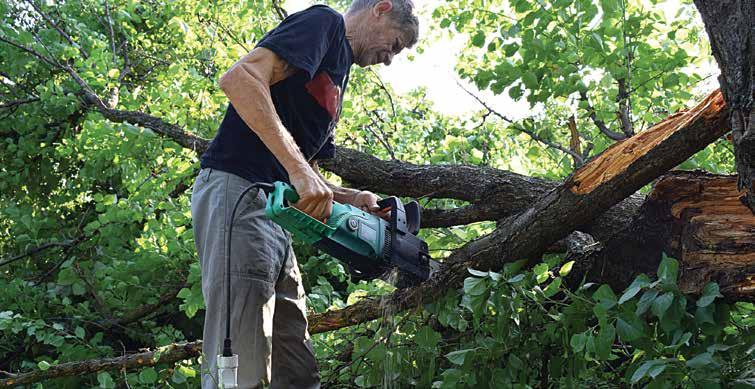
There’s a meaningful quote from the late, great Fred Rogers:
When I was a boy and I would see scary things in the news, my mother would say to me, “Look for the help ers. You will always find people who are helping.”
I believe we have all seen these helpers in times of crisis, but I’m finding that I’m seeing helpers doing wonderful things every day. When I see veteran teachers reaching out to novice teachers simply
to say “What can I do to help?” or “Just checking on you,” that is just as import ant as lending a neighboring strings pro gram a 1/2-size bass or even a platoon of choir parents showing up to a flooded music room with shop vacs, towels, and cleaning supplies simply because they want to help.
In my estimation, these seeming ly disparate examples are all coming from the same place. These helpers are helping because they are able, and they are helping because they value what those in need provide. I have been the recipient of these acts of kindness throughout my life and quite recently got a pep talk I didn’t realize I needed from a friend and colleague, but I’m so grateful they sensed that I might need some kindness.
Throughout my nearly 30 years of teaching, I have seen a commonality among our performing arts colleagues.
Despite all the pressures related to logis tics, calendars, and upcoming perfor mances, we can be exceptionally adept at noticing our students and colleagues and being attuned to even the most subtle changes in their moods and behaviors. It is in those times that a simple “Are you OK?” or “Let me know if I can help” comment can make a world of difference to them, simply because we know, value, and—dare I say—love our students and colleagues.
As we move toward the conclusion of our fall semester, let us continue to reinforce the concept of helping or grace or kindness in our everyday interactions with those around us. Also, let’s not only fol low Mr. Roger’s wise words to “look for the helpers” in our classrooms, hallways, teacher lounges, front offices, and com munity, but to revel in the joy of being a helper, too.
48 Florida Music Director
FLORIDA MUSIC SUPERVISION ASSOCIATION
Lindsey R. Williams, PhD, President
EachNovember, as the temperature begins to drop and every menu seems to include some sort of pumpkin spice some thing or other, we are all bombarded with reminders to be thank ful. We see it on billboards, in those annoying ads in the middle of our YouTube videos, and painted on storefront windows. Indeed, across the country, November opens our “holiday season” and is generally considered to be a special time to give thanks.

Nevertheless, things aren’t always peaches ’n’ cream, and many of us might find it difficult to soften our hearts and main tain a posture of thankfulness this year. Only a few weeks ago, the awesome power of nature was on full display as Hurricane Ian caused destruction across our state and was particularly devastating for our friends in and around Fort Myers. Today, more than a month later, the recovery efforts continue, and our colleagues work fervently to put the pieces of their lives back together. This year, we’ve also seen new wars raging overseas and what seem to be incessant social and political conflicts here at home. Amidst it all, thankfulness is not usually the first word to come to mind.
Yet, WE remain. Here. Now. In the only time we get. So, take heart, because you are not alone. TOGETHER, we will respond to life’s opportunities with persistent creativity and courage, and I am certain you will prevail. My confident optimism is fueled by my faith in your ability to thrive in spite of the hurdles placed in your path. Like forged steel, you too are capable of emerging stronger and more malleable after the extreme pressures you’ve experienced.
As I observe, I am awestruck by both your brilliance and your resilience, and I am thankful for YOU! I am thankful you will breathe new life into our profession. I am thankful our children will get to watch you model love, joy, patience, kindness, good ness, and respectfulness. I am thankful you will teach them how to persevere when the finish line may still be out of sight.

Finally, I am thankful for the community you have created within NAfME Collegiate. It is precisely that community that will enable you to conquer the world soon enough. King Solomon wrote, “A person standing alone can be attacked and defeated, but two can stand back-to-back and conquer. Three are even better, for a triple-braided cord is not easily broken” (Ecclesiastes 4:12, NLT). Therefore, let’s continue to lean on each other, look for reasons to smile, and be thankful. The best is yet to come!
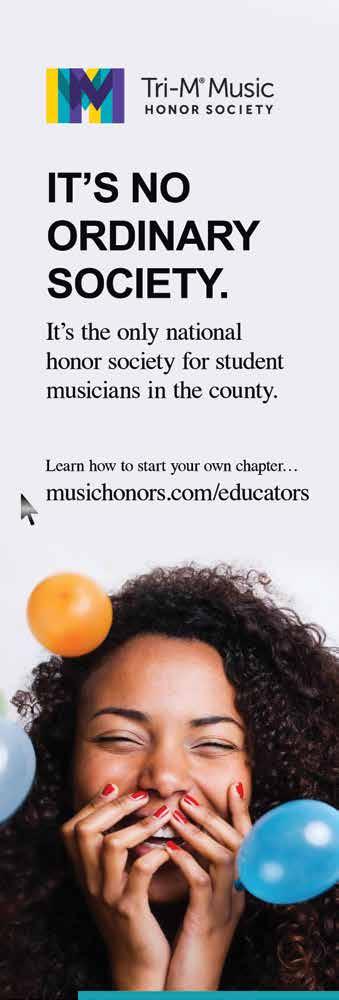
November 2022 49
FLORIDA NAfME COLLEGIATE Mark A. Belfast, Jr., PhD, Advisor
Component News
Teddy bear hunts!
That’s how my community came together to entertain our children in the first month of the pandemic.
When the lockdown began in spring 2020, it was the children of Florida who struggled the most. With parks, librar ies, beaches, malls, and museums closed, it was hard to find things to do. My 6-year-old daughter was stuck at home for endless hours and desperately needed entertainment. The first few weeks were filled with online streaming, and by the end of April, my wife and I could act out the entirety of Frozen 2 by memory. My daughter found entertainment, but what she couldn’t find was social interaction.
The parents in our neighborhood knew something had to be done, so in late April of 2020 we came up with a creative activi ty. A teddy bear hunt! Nearly all the near by homes placed teddy bears in their win dows. Some cuddling in large groups and others sneakily hiding behind window panes, all looking outward with those big bear eyes. The teddy bears provided near endless entertainment each day, and the children would talk about it while pass ing their friends. Which bears moved and how many did you count today? Was that bear wearing baby clothes? Does a stuffed
giraffe count as a “teddy bear”? The teddy bear hunts in my small corner of Florida were a testament to how a community can come together to solve one small problem associated with an international disaster beyond our control.
Sadly, our Florida community is now facing another devastating challenge in the aftermath of Hurricane Ian. Personal injury and loss, coupled with catastrophic damage to property, have left communi ties in ruin. As we rebuild, I am reminded of the teddy bear hunts from the early

FLORIDA COLLEGE MUSIC EDUCATORS ASSOCIATION
 Marc Decker, DMA, President
Marc Decker, DMA, President
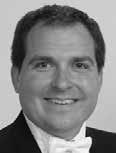
days of the pandemic and how meaning ful such a small thing was to my family. We can rebuild our Florida community together through the smallest gestures, either financially or by volunteering our time and creativity. It is through the collection of many small gestures of kind ness that we will overcome this challenge together.
My thoughts and prayers are with all those in Florida who were most affected by the hurricane. We will rebuild together and become stronger.
Print. Digital. Direct. 50 Florida Music Director
FLORIDA ORCHESTRA ASSOCIATION
Laurie Bitters, President
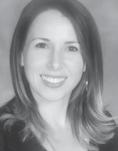
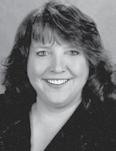
For many in the state of Florida, this past month has brought many stresses and heartbreak. Some areas were devas tated by Hurricane Ian, and many resi dents lost everything. I have been most impressed with how music teachers and students from around the state have ral lied to help in any way they can. Some schools have had fundraisers at their concerts and have asked to donate the
proceeds to music programs impacted by the hurricane. Others have collected instruments and other donations to help these programs get back on their feet. How wonderful it has been to hear about that level of generosity! If you are inter ested in helping, the FMEA website has a link to help donate.
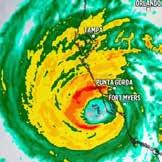
It was so good to see many of you at the FOA/FLASTA Fall Conference just a
few weeks ago. The sessions were fantas tic, and the highlight for me was seeing all those musicians play such a wide variety of music during the reading ses sions. David Eccles did an amazing job of showcasing diverse styles of music that featured underrepresented composers. I hope you were able to take some of the information that was shared back to the classroom.
FLORIDA VOCAL ASSOCIATION Jeannine Stemmer, President
What do we do when our plans are derailed? What do we do when our most basic needs are stripped from us? On September 24, 2022, Florida prepared for Hurricane Ian. It was projected that Tampa would be hit directly by the storm. The city announced school closures and prepared for the worst. However, on September 28, the catastrophic category 4 hurricane made landfall in Lee County, approximately 120 miles south of Tampa. Many Floridians were affected by the devastation, but Lee County was left in pieces.
Years ago, I had a personal storm. On Friday, August 15, 2014, my colleague, Barbara Kingman, and I had a rehearsal with our advanced ladies ensemble a few days before the beginning of the school year. That evening she told me she was in too much pain to get up from the piano. We quickly found out that an undiagnosed illness had taken over her body, and she passed away the next afternoon. There I stood, the Saturday before the start of the school year, without my colleague, my partner, my mentor, and my friend. As I walked through the double doors on Monday morning, to my surprise I was greeted by two alumni and three parents. They had all taken the week off to get me on my feet and help me survive. One of those parents stayed for three weeks. I didn’t need to figure it out or do it on my own. I had a community. A community that wasn’t necessarily doing me a favor, but they were answering a calling that filled their hearts as much as it filled mine. How can one see the silver lining in Hurricane Ian? The answer is community. Our communities will help pick up the pieces. They will get you on your feet and help you survive. While the struggle is real, there is beauty to be seen through the devastation. FVA and FMEA will continue to support our state as we rebuild in such a time as this.
https://FMEA.org/help
We’ve just completed a major task: allstate auditions. This process was not as smooth as in other years because many districts could not complete their audi tions within the scheduled window. I am so impressed with our district chair persons who went out of their way to make sure that all of the students who could complete their auditions did so. For some, that included multiple recording days and/or driving to multiple sites to complete this task. Thank you, district chairpersons, for all of your hard work! After the auditions were recorded, dozens of our members met in Orlando to adjudi cate them. In one day, these selfless judges listened to many auditions from around the state to create our all-state groups. I cannot adequately express my gratitude to those of you who volunteered your time to assist in the audition evaluation process. I am extremely impressed with the professionalism of the teachers who participated. The results will be posted on the website later this month. As we look forward to the FMEA Professional Development Conference, don’t forget to check the deadlines for hotel room reser vations as well as conference registration. There are many great sessions scheduled. I hope I will see you all there!
Thank you for continuing to provide such a wonderful musical experience for our young people. Never forget the differ ence you make in the lives of the children in your classroom and beyond.
November 2022 51
FLORIDA MUSIC EDUCATION ASSOCIATION
2022-2023 DONORS
Thank you to all of the donors who have shown their dedication to the improvement of music education in Florida by supporting our Mission through financial contributions.
Our donors support specific causes by donating to the FMEA funds of their choice: FMEA Scholarship Fund Music Education Advocacy General Fund
June M. Hinckley Scholarship Professional Development for Members Mel & Sally Schiff Music Education Relief Fund
The following have graciously donated to FMEA from April 1, 2022, through October 17, 2022.
MAESTRO’S CIRCLE
$10,000 and up
No current donors at this time.
ARTIST’S CIRCLE
$1,000 – $9,999
All County Music Artie Almeida
In Honor of June Audrey Grace & Katie Grace Miller Clifford Madsen Russell Robinson
SUSTAINERS
$100 – $999
Carlos Abril
In Honor of Dr. Nicholas DeCarbo Lucinda Balistreri
In Honor of music educators in Sarasota Christopher Banks Kasia Bugaj Dale Choate
Deborah Confredo Alice-Ann Darrow
In Memory of Mr. & Mrs. O.B. Darrow Virginia Densmore
In Honor of Vicki Rhodes Virginia Dickert
In Memory of Lindsay Keller & Debbie Liles Scott Evans
Kristin Greene
In Memory of Charles E. Inderwiesen, Jr. Stanley Hoch
Dennis Holt
Frank Howes
In Memory of Richard Bowles & Harry Grant Marsha Juday
Steve & Beth Kelly Sheila King
In Memory of John W. King
Jason Locker
In Memory of June M. Hinckley
& In Honor of those impacted by Hurricane Ian David Martinez-Cooley
Robert McCormick Carolyn Minear
52 Florida Music Director
S U S TA INE RS continued
John Nista
In Memory of Stanley Dmitrenko
Mar y Palmer
In Memory of Amy Catherine Palmer David Pletincks
In Honor of Alexis & Jonathan Pletincks Jeanne Reynolds
In Honor of Pinellas County Performing Arts Teachers Rollins College Department of Music Mar y Catherine Salo
In Memory of Gary Rivenbark & Wes Rainer Steven Salo
In Honor of John “Buck” Jamison & Dr. William Prince Kathleen Sanz
In Memory of June M. Hinckley Fred Schiff
J.Mark Scott
In Honor of Dr. Andre Thomas, Dr. Judy Arthur, & Dr. Judy Bowers Scott Sheehan
In Honor of those impacted by Hurricane Ian
PATR ON S
$25 – $99
Scott Apelgren Michael Antmann
Judy Arthur
In Honor of Raymond Kickliter & Nancy Marsters William Bauer David Bayardelle
On Behalf of Harry Spyker Mark Belfast
In Memory of D r. Mark A. Belfast, Sr. Richard Bradford
In Honor of William S. & Helen H. Bradford Greg Carswell Blair Clawson
In Honor of Ginny Densmore, Alice-Ann Darrow, & Vicki Rhodes Dayna Cole
In Memory of Linda Mann Paul Davis Marc Decker Dewey Dodds Judith Evans
D.Gregory Springer Jeannine Stemmer
In Memory of Barbara Kingman & Lauren Alonso Leiland Theriot
In Memory of Clayton Krehbiel Richard Uhler
James Weaver Howard Weinstein
In Memory of Barry Weinstein Donald West
In Memory of Ron Powell, Vista Audio Productions, Inc. Blair Williams David Williams
Billy B. Williamson Marilyn Wirsz
In Memory of Bill & Shirley Head
Anonymous (1)
In Memory of Bonnie Nista
Bradley Franks
In Memory of Gary W. Rivenbark Julie Hebert
Julia House
In Memory of Dr. Kimberle Moon McKee Monroe Lewis Joseph Luechauer Kevin Lusk
John Marshall Lloyd McIntyre
In Memory of Bob Hager Kim Miles
Katie Grace Miller
In Honor of Artie Almeida Victor Mongillo
Ree Nathan Galen Peters Edward Prasse Melissa Rawls John Sinclair
Joanna Sobkowska Parsons John Southall Mark Stevens
Valerie Terry David Verdoni John Watkins
Sondra Wenninger Collins Graeme Winder
On Behalf of all our hardworking music educators
Anonymous (4)
November 2022 53
Continued on page 54
FRIE NDS
Crystal Berner
Laurie Bitters
Jessica Blakley
In Memory of John Rose
Antonio Borges Thomas Brown
In Honor of Dr. Samuel A. Floyd Joseph Callaway Gwendolyn Carroll
Bethany Confessore Beth Ann Delmar
Jodie Donahoo
Revae Douglass Ross Denise Dumala
Christopher Dunn Monica DuQuette Debbie Fahmie Shelby Fullerton Michael Gabriel
Tina Gill
In Memory of Gary Rivenbark
Walter Halil James Hammond Angela Hartvigsen William Hazlett Jon Hutchison Jason Jerald Kathleen Kerstetter Mary Keyloun Cruz
In Memory of George Paul Keyloun Deborah Mar
In Dedication to Mrs. Barbara Kingman
Kyle Matthews
Katie McGuire Menges Ethan Morency Chad Norton
In Memory of Cassandra Jean Norton Jessica Oyster
In Honor of the new band director in my family John Parris Hank Phillips Amanda Quist
In Memory of Patricia Koning
Diana Rollo Melissa Salek Ian Schwindt Joani Slawson Kelly Southall Eddie Steadman Andrea Szarowicz Mark Thielen
Noiree Weaver
Bradley Wharton Julian White
In Memory of Kenneth Tolbert Lindsey Williams Jennifer Zahn
Anonymous (11)
DONORS Continued from page 53 54 Florida Music Director
up to $24 Print. Digital. Direct. � The Florida Music Director Magazine � Conference Program � All-State Concert Program � Conference Sponsorships � Direct Sponsored Emails � Website Banner Ads Florida Music Education Association offers advertising in: Information can be found at FMEAMediaKit.org Florida Music Director reserves the right to refuse any ad not prepared to the correct specifications OR to rework the ad as needed with fees applied.
Committee Reports
In this month of thankfulness, I find myself thinking of so many who have done so much for me, for my work, for FMEA, and for music education as a whole. I could not be filled with more joy over all those for whom I am so grateful.
I want to take this opportunity to thank everyone who took the time to submit a nomination packet for the 2023 FMEA Awards Program. It was obvious that the nominators put much time and effort into the application process. We received applications representing all areas of the state, from large districts to small rural districts. The selection committee was impressed by seeing evidence of quality music education happening in a variety of demographic settings. We certainly have many worthy individuals and pro grams we would love to celebrate.
I also want to seize the oppor tunity to thank the dedicated members of the FMEA Awards Committee, who had the daunting job of selecting awardees for each major category. Trust me when I say it was no small job. The com mittee did due diligence in review ing each and every list of achieve ment and letter of support pre sented in each nomination packet, ultimately selecting our awardees. Soon you will have the opportuni ty to read about all of the amazing 2023 FMEA awardees. I know you will be just as inspired by them as we are.
As you think about all those you would like to thank this month, I’d like to put out one last special message of grati tude for the recipient of our 2022 FMEA Conference Service Award, the amazing Dr. John Southall. His tireless work on behalf of FMEA as our FMEA conference planning committee chairperson is so very appreciated by so many.
AWARDS COMMITTEE
Sondra A. W. Collins, Chairperson
Debbie Fahmie, past awards committee chairperson, states it best:

Just over a decade ago, Joe Luechauer established a Conference Planning Committee and appointed Dr. John Southall to head it up. Having served on that committee for 11 years, I have gotten to know the real John Southall very well. I see John as the Wizard of Oz … the man behind the curtain who no one really sees, but who is responsible for making it all work. It’s not just magic, but lots and lots of time, labor, and love that go into putting together a conference year after year, despite whatever challeng es are thrown at you. John makes
FMEA shine when the success of the conference is being realized. John has served in this capacity under seven FMEA presidents now and somehow manages to meet the high demands of all the various components and com mittees. There is no one more deserv ing of the FMEA Conference Service Award than Dr. John Southall.
Let’s hear from Dr. John Southall, chair of the Performing and Visual Arts Department, director of bands, and coor dinator of music education and music therapy at Indian River State College, and conference planning committee chairper son and past president of FMEA, in his own words, on gratitude:
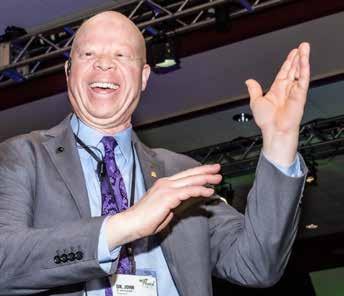
I’d like to thank the FMEA Awards Committee for bestowing this won derful honor upon me. I am deeply honored and humbled by this wonderful award.
This award should be given to everyone. I would like for every volunteer, every FMEA staff member, Dr. Kathy Sanz, our execu tive director, and everyone involved in making our FMEA conference wonderful—I would like for all of you to accept this award with me. We would not have, arguably, the most outstand ing professional development conference in the nation without the wonderful leadership from our staff members, our Executive Committee, our FMEA Board, and the hundreds of volunteers—event coordinators, ensemble coordinators, session coordinators, and more. It would not happen without all of these indi viduals. And of course—Val Anderson! We must all accept this award together, with the greatest humility and the greatest honor.
I appreciate all of the thought and the kindness for considering me for this award, and I gladly accept it for everyone.
November 2022 55
It is not the joy that makes us grateful; it’s the gratitude that makes us joyful.
Committee Reports
SOCIAL JUSTICE & DIVERSE LEARNERS COMMITTEE
Alice-Ann Darrow, Chairperson

Most people, and especially teachers, would agree the last two years have been challenging. COVID affect ed our health, jobs, and socialization. Then, this fall we experienced one of the most devastating hurricanes to hit our state. Life has been tough. I hope music educators throughout the state have felt FMEA’s presence during these trying times. I know that a good percentage of our board meetings are spent discussing how to support and maintain contact with our members. We have attempted to do so through ongoing advocacy efforts, offering professional development, main taining our publications, continuing our component meetings and conferences, and providing relief funds for teachers and schools in need. Music educators are amazingly resilient. It has been impres sive to see the way our teachers have per severed and come back to the classroom still excited to teach.
FMEA 2023 is only two months away. The FMEA conference committee, staff, components, and board are working hard to make FMEA 2023 a rewarding and educationally productive conference. We hope you will be there. We are eager to see you and to reconnect. This issue and the December issue of Florida Music Director will publicize some of the confer ence highlights.

Session Topics for FMEA 2023
The committee for Social Justice and Diverse Learners is facilitating three ses sions at FMEA 2023. The social justice topics for these sessions were selected because of their relevance to music edu cators. Social justice is the view that all people deserve equal rights and justice in terms of economic and political opportu nities and privileges within a society. By its definition then, social justice is com prehensive. Because of time constraints, our three session topics for FMEA are not comprehensive, but they do warrant atten tion due to issues facing music teachers and students in schools today. The session topics for the 2023 FMEA Professional Development Conference are:
« Transforming and Empowering Women Through Choral Music and Community
« Facilitating the Success of Students With Disabilities Through University and School Partnerships
« Supporting LGBTQ Music Educators and Students Through Gay Choirs
The following pages provide a glimpse into the ideas that will be expanded on during the conference. I hope the FMD readership will be interested in learning more about these topics at FMEA 2023. If any member has an idea for future FMEA session topics related to social justice and diverse learners, please do not hesitate to contact me at alifsu@mac.com. I hope to see you in Tampa, January 11-14, 2023!
References
American Association of Union Workers. (2022). The simple truth about the gender pay gap. AAUW Research and Data. Retrieved from https://www.aauw.org/resources/research/ simple-truth/
Block, M. (2022, March 30). Teachers fear the chilling effect of Florida’s so-called ‘Don’t Say Gay’ law. NPR News. Retrieved from https://www.npr.org/2022/03/30/ 1089462508/teachers-fear-the-chilling-effectof-floridas-so-called-dont-say-gay-law Field, K. (2022, May 23). Under new laws, some teachers worry supporting LGBTQ students will get them sued or fired. USA Today Retrieved from https://www.usatoday.com/ story/news/nation/2022/05/23/lgbtq-civilrights-laws-worry-some-teachers-who-fearpunishment/9859737002/?gnt-cfr=1
Jones, J. M. (2021, February 24). LGBT identification rises to 5.6% in latest U.S. estimate. Gallup News. Retrieved from https://news.gallup.com/poll/329708/ lgbt-identification-rises-latest-estimate.aspx
National Center for Education Statistics. (2022). Characteristics of public school teachers. Condition of Education. U.S. Department of Education, Institute of Education Sciences. Retrieved from https://nces.ed.gov/ programs/coe/indicator/clr
Neile, R. (2020, June 16). Fired gay teacher ‘ecstatic’ after Supreme Court grants LGBTQ workplace protection. Florida Today. Retrieved from https://www.floridatoday. com/story/news/2020/06/16/fired-gayteacher-ecstatic-after-supreme-court-grantslgbtq-workplace-protectionfired-gayteacher-e/3197578001/
United States Census Bureau. (2022). What is the gender wage gap in your state? Retrieved from https://www.census.gov/ library/stories/2022/03/what-is-the-genderwage-gap-in-your-state.html
Webb, L., Clary, L. K., Johnson, R. M., & Mendelson, T. (2021). Electronic and school bullying victimization by race/ ethnicity and sexual minority status in a nationally representative adolescent sample. Journal of Adolescent Health , 68(2), 378–384.
56 Florida Music Director
The Tri-M Music Honor Society is a program of the National Association for Music Education, which focuses on creating future leaders in music education and music advocacy. Learn more at: musichonors.com
Transforming and Empowering Women Through Choral Music and Community
In the future,
Why women? Recent data indicate that 76% of the teachers in public schools are women (National Center for Education Statistics, 2022). Women teachers experience inequities even today. For exam ple, the gender-based wage gap in the United States has narrowed in recent years, but disparities remain: the national wage gap for women was $10,150, though less in Florida at $7,705, according to the U.S. Census Bureau (2022). “Women working full time in the U.S. are still paid just 83 cents to every dollar earned by men—and the consequences of this gap affect women throughout their lives. The pay gap even follows women into retirement: As a result of lower lifetime earnings, they receive less in Social Security and pensions. In terms of overall retirement income, women have only 70% of what men do” (AAUW, 2021, para. 2).
– Sheryl Sandburg
Historically, inequities existed for women even in the arts. At one time, women were told they were not going to be conductors or composers, and it was very unlikely they would ever play professionally in an orchestra. Women were not allowed to participate in marching bands. Across the globe, many women face restrictions personally, academically, medically, and socially based on their sex and gender. Only in the last half century have women in the United States won the right to earn equal pay for equal work, the right to participate in educational or sports programs funded by the federal government, the right to be hired and work while pregnant, and the right to apply for a credit card or a mort gage without a husband or father cosigning.
There is no doubt women have made considerable progress in recent years. Yet, only in the last 50 to 75 years have women become conductors of professional orchestras, Pulitzer Prize winners in music, Supreme Court justices, secretaries of state, an attorney general, the speaker of the House, U.S. astronauts, and in 2020, vice president of the United States. It is fair to ask the question: Will there ever be a woman governor of Florida or U.S. president?
November 2022 57
there
will be no female leaders.
There
will just be leaders.
Women belong in all places where decisions are being made. It shouldn’t be that women are the exception.
– Ruth Bader Ginsburg
Facilitating the Success of Students With Disabilities Through University-School Partnerships
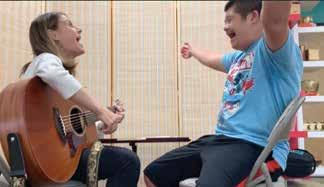
Why students with disabilities? Title II of the Americans with Disabilities Act of 1990 (ADA) II states: “[N]o qualified individual with a disability shall, by reason of such disability, be excluded from participation in or be denied the benefits of the services, programs, or activities of a public entity, or be subjected to dis crimination by any such entity.” Yet, the arts education gap is widest for students with disabilities and those living in poverty. The Every Student Succeeds Act (ESSA) calls on states to take advantage of opportunities to combat uneven access to quality instruction in music and the perform ing arts—a key component of a well-rounded education. Nevertheless, students with disabilities still face barriers to access music education and music-making. Many students are unable to find private teachers who meet their needs, or the knowledge and funds to access adapted instru ments, and many music educators in schools still grapple with the challenges of teaching students with disabilities, especially those with multiple disabilities.
Music education, like all education for students with disabilities, has improved for students with disabilities. We have moved from an exclusion model, where students were educated in segregated, self-contained classrooms, to an inclusion model, where students with disabilities have the right to a free and appropriate music education in the least restrictive environment. Each year, increasing numbers of students with disabilities participate in school music programs. Before the Individuals with Disabilities Act was passed, public schools educated approximately only one in five children with disabili ties. Most children with disabilities were denied access to their neighborhood schools and were educated in segregated institutions if they were educated at all. We have come a long way indeed, but we still must work to close the arts education gap for students with disabilities. University-school partnerships are one way we can narrow that gap.
University-school partnerships are mutually beneficial collaborations between institu tions of higher education and PK-12 schools for the purpose of supporting teacher educa tion, in-service teacher professional development, and PK-12 student learning. They can also be collaborations between a university teacher preparation program and a local PK-12 school or district. Over the last 20 years, music teacher preparation programs have stressed the need for quality fieldwork experiences for university students preparing to be music educators. Perhaps because the music education of students with disabilities is often seen as distinctly different from general music education, univer sity-school partnerships in music and special education are rare. By including a session on such partnerships at FMEA 2023, perhaps more university and school educators will seek to collaborate and thus promote the successful music educa tion of students with disabilities in music classrooms.
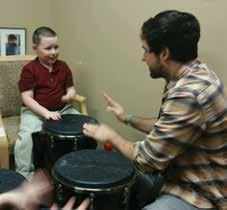
58 Florida Music Director
Photo:
alabamafamilytrust.com
Photo:
musicworxinc.com
Supporting LGBTQ+ Music Educators and Students Through Gay Choirs
Why LGBTQ+ music educators and students? In 2022, more teachers and students than ever before identify as LGBTQ+, yet we live in a time when policy and societal pressures can often make life difficult for many of our teachers and students (Jones, 2021; Block 2022). After years of increasing support, many teachers now report feeling unsafe and concerned about their job secu rity. LGBTQ+ youths’ educational success and personal well-being are also in potential jeopardy (Neale, 2020; Field, 2022). Recent research indicates that bullying is still having wide-ranging, negative, and cascading effects on young people’s overall mental and physical health, including increasing odds of attempting suicide (Webb, et al., 2021). As music educators, we can make our classrooms a safe place for all students; however, musical refuge can happen in other spaces as well. Gay choirs are one means of providing support to our colleagues and students. Gay choirs have existed for nearly half a century in the United States. Gay choirs create and serve communities, foster music education, and share many pedagogical techniques with other types of musical ensembles. The first gay choir came into existence in 1978. Its director, John Reed Sims, was committed to providing quality music. The choir was an instant success and continues today. The mission statements of most gay choirs include sentiments such as “to create extraordi nary music and experiences that build community, and foster compassion and understand ing”— sentiments shared by many musical organizations. Like all music ensembles, gay choruses provide community, friendships, and musical fulfillment. Choirs have also taken the opportunity to extend the message of tolerance, especially concerning students who are bullied. Several directors have commissioned choral works that include lyrics intended to provide support and comfort to these students. As music educators, we can also support our students by including repertoire and performances that highlight the intersectionality of the LGBTQ+ community and some of our most prolific musical composers and artists.
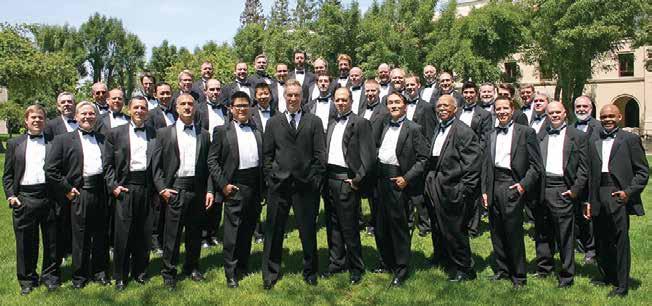
November 2022 59
Gay Men’s Chorus of Tampa Bay. Photo: cltampa.com
The mission of
FMEA Responds to Hurricane Ian

FMEA
and the entire music community is concerned about the welfare of our students, families, and teachers who experienced the devastation of Hurricane Ian. Our hearts and thoughts are with all of you. In an effort to assist in the comeback, FMEA has established ways you can reach out for assistance as well as ways you can help those in need.
How to Request Assistance
How to Help
Donate to the Mel and Sally Schiff Music Education Relief Fund on the FMEA Donation Page at org/help. Just click on the form. This fund was started by FMEA board member Fred Schiff in honor of his parents shortly after Hurricane Irma in 2017. A committee will meet to determine the distribution of funds among the schools that have submitted Help Requests.

You can find other ways to help by clicking on the View Music Program Needs button. There you can browse the list of needs submitted by our schools and contact the teachers directly to let them know how you can help. Even if you don’t have the specific items requested, perhaps there is another way you can help them recover.
FMEA is also working closely with national organizations to seek assistance for Florida schools.

Mr. Holland’s Opus Foundation
Administered by the Mr. Holland’s Opus Foundation (MHOF), Music Rising is a national relief fund for schools affected by natural disasters in the United States and U.S. terri tories. In response to Hurricane Ian and its damage to Florida, schools that experienced loss of or damage to musical instruments may qualify for a donation of instruments through the Music Rising program. Schools
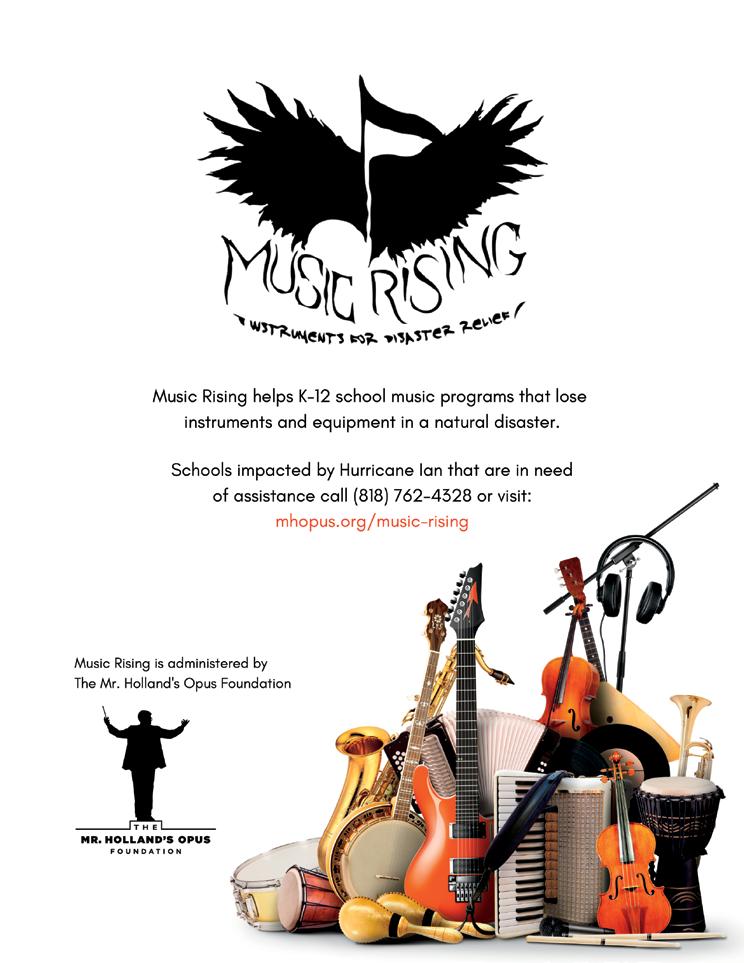
60 Florida Music Director
the Florida Music Education Association is to promote quality, comprehensive music education in all Florida schools. ExecutiveDirector’sNotes
Go to FMEA.org/help Submit A Help Request button.
January 11-14, 2023. The FMEA leadership and staff are looking forward to seeing everyone there.
The FMEA hotel block opened September 24. Please note that the deadline to cancel an unneeded hotel room is November 12, 2022, at 5:00 pm, after which time your credit card will be charged the first night’s stay. See more information in this magazine.
Professional Development Opportunities for Members

« Summer Institute – The FMEA Summer Institute will be held June 12-14, 2023, at the University of South Florida in Tampa. The Summer Institute is an inspiring multiday professional development training involving a relatively small number of successful, well-respect ed music educators. The Summer Institute application is on the FMEA website.
« FSMA Summer Leadership – Florida School Music Association (FSMA) will once again hold their Summer Leadership Seminar July 16-19, 2023, at the Renaissance Sea World in Orlando. Talk to your component leadership to receive additional information on this excellent experience to devel op your skills.
Health and Wellness
Please continue to be aware of your own as well as your students’ physical and mental health. There will be a 3K walk/run during the FMEA conference in January. Sign up on the FMEA website to participate.
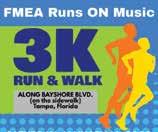
Looking forward to seeing you in January at the FMEA Professional Development Conference and AllState Concerts.
Kathleen D. Sanz, PhD
2022-23 FMEA Membership:
You are eligible for membership in the Florida Music Education Association if you are an individual engaged in the teaching, supervision, or administration of music in elementary and secondary schools, colleges, or universities within the state. Visit FMEA.org/membership to learn more about the benefits of active membership.
SUBSCRIPTIONS:
Direct correspondence regarding subscriptions to: Hinckley Center for Fine Arts Education 402 Office Plaza, Tallahassee, FL, 32301-2757
Subscription cost included in FMEA membership dues ($9); libraries, educational institutions, and all others within the United States: $27 plus 7.5% sales tax.
CIRCULATION:
The circulation of the Florida Music Director is 4,500 educators. Published eight times annually by The Florida Music Education Association, Hinckley Center for Fine Arts Education: 402 Office Plaza, Tallahassee, FL 32301-2757.

FMEA reserves the right to approve any application for appearance and to edit all materials proposed for distribution. Permission is granted to all FMEA members to reprint articles from the Florida Music Director for non-commercial, educational purposes. Non-members may request permission from the FMEA office.
SUBMISSIONS:
Article and art submissions are always considered and should be submitted on or before the 1st of the month, one month prior to the publication issue to: D. Gregory Springer, PhD, dgspringer@fsu.edu.
All articles must be provided in digital format (e.g., Microsoft Word). All applicable fonts and images must be provided. Images must be at least 300 dpi resolution at 100% of the size. All submissions must be accompanied by a proof (color, if applicable). Ads may be submitted via email to val@fmea.org
Advertiser Index
The Florida Music Director is made possible by the participation of the fol lowing businesses whose
appear in this issue. They make it possible to provide you with a high-quality publication, and we gratefully acknowledge their support of our mission. We hope you will take special notice of these advertisements and consider the products and services offered. It is another important way you can support your professional association and the enhancement of Florida music education.
The publisher does not endorse any particular company, product, or ser vice. The Florida Music Education Association (FMEA) is not responsible for the content of any
reserves the right to accept or refuse
for advertisers (rate
the right to refuse any
etc.) can be found at FMEAMediaKit.org
rework the ad as needed
November 2022 61
FMEA Executive Director
Kathleen D. Sanz, PhD
advertisements
advertisement and
any advertisement submitted for publication. Information
card, insertion orders, graphics requirements,
Florida Music Director reserves
ad not prepared to the correct specifications OR to
with fees applied. ADVERTISER Florida International University ......................................................................... IFC Naples Concert Band 6 Patel Conservatory at the Straz Center for the Performing Arts 35 Sight Reading Factory 24 University of Florida............................................................................................... BC Advertisers shown in bold provide additional support to FMEA members through membership in the Florida Corporate and Academic Partners (FCAP) program. FCAP partners deserve your special recognition and attention.
PARTNERS
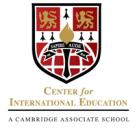


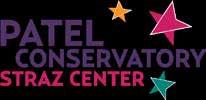




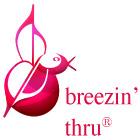

GOLD
Partners as of October 17, 2022. *Please visit FMEA.org/partners for partnership details or call 850-878-6844. BRONZE PARTNERS Please take time to thank and support our 2022-2023 Corporate Partners. SILVER PARTNERS Mark Custom Recording Service, Inc. Eastman Music Company Head’s House of Music Meloquest, Inc. Music & Arts Music Man, Inc. Orlando Sings West Music Company 62 Florida Music Director
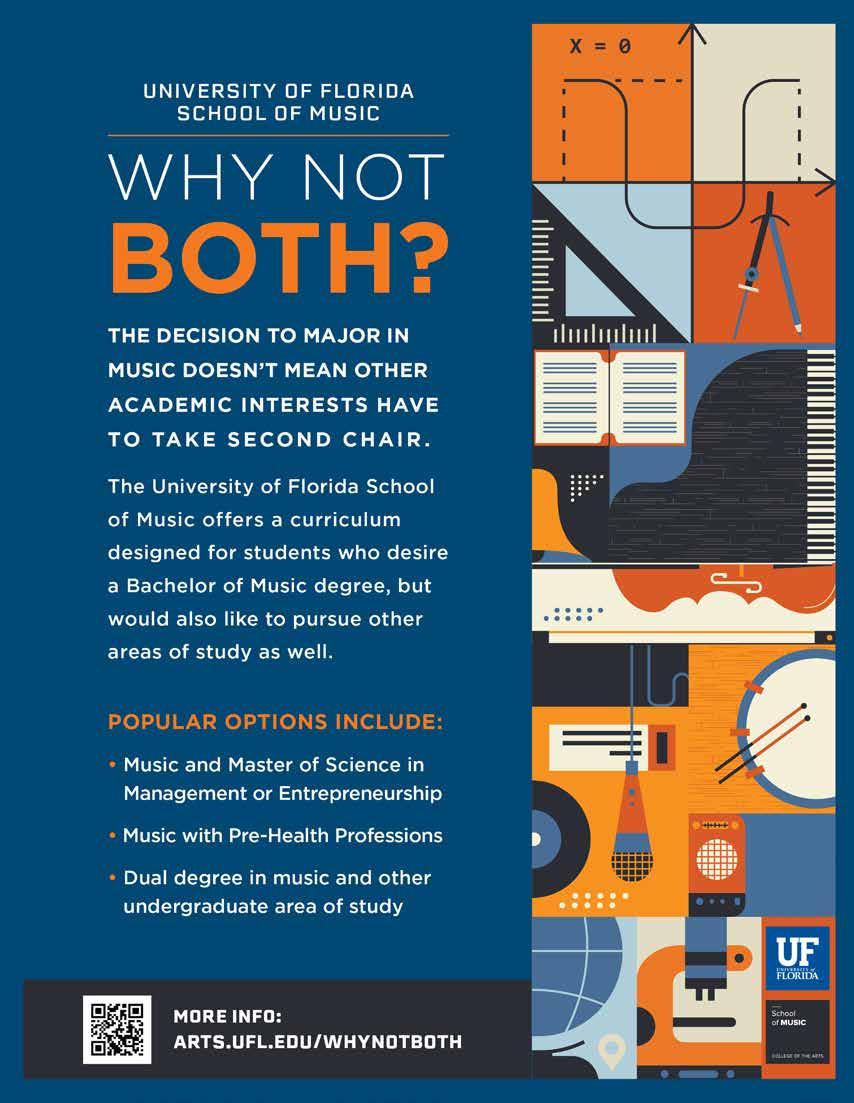





























































































 FLORIDA CORPORATE & ACADEMIC PARTNERS
FLORIDA CORPORATE & ACADEMIC PARTNERS

























 Marc Decker, DMA, President
Marc Decker, DMA, President



























